#john beynon
Explore tagged Tumblr posts
Text
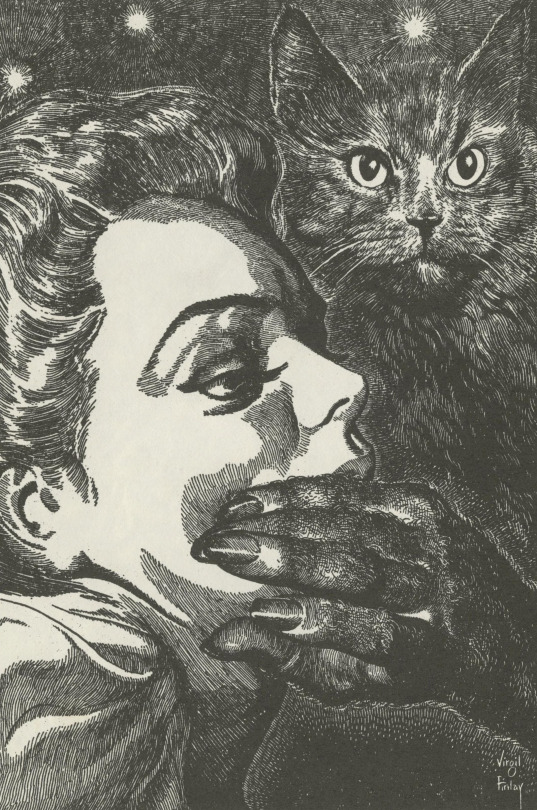
Virgil Finlay - The Secret People
(Famous Fantastic Mysteries - April 1950)
#virgil finlay#the secret people#john beynon#famous fantastic mysteries#pulp art#horror art#fantasy art#story illustration#art#illustration
543 notes
·
View notes
Text

Chris Foss cover for John Wyndham's Wanderers of Time
8 notes
·
View notes
Text
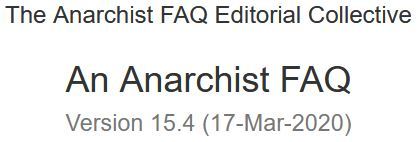
Bibliography for FAQ
Non-Anarchist Works
Adams, Arthur E., Bolsheviks in the Ukraine: the second campaign, 1918–1919, Yale University Press, New Haven, 1963
Anderson, Terry L. and Leal, Donald R., Free Market Environmentalism, Pacific Research Institute for Public Policy,San Francisco, 1991.
Anweiler, Oskar, The Soviets: The Russian Workers, Peasants, and Soldiers Councils 1905–1921, Random House, New York, 1974.
Archer, Abraham (ed.), The Mensheviks in the Russian Revolution, Thames and Hudson Ltd, London, 1976.
Arestis, Philip, The Post-Keynesian Approach to Economics: An Alternative Analysis of Economic Theory and Policy, Edward Elgar Publishing Ltd., Aldershot, 1992.
Armstrong, Philip, Glyn, Andrew and Harrison, John, Capitalism Since World War II: The making and breakup of the great boom, Fontana, London, 1984.
Capitalism Since 1945, Basil Blackwell, Oxford, 1991.
Arrow, Kenneth, “Economic Welfare and the Allocation of Resources for Inventiveness,” in National Bureau of Economic Research, The Rate and Direction of Inventive Activity, Princeton University Press, 1962.
Aves, Jonathan, Workers Against Lenin: Labour Protest and the Bolshevik Dictatorship, Tauris Academic Studies, London, 1996.
Bain, J.S., Barriers in New Competition: Their Character and Consequences in Manufacturing Industries, Harvard University Press, Cambridge, 1967.
Bakan, Joel, The Corporation: The Pathological Pursuit of Profit and Power, Constable, London, 2004.
Bakunin, Michael, The Confession of Mikhail Bakunin, Cornell University Press, Ithaca, N.Y., 1977.
Bukharin, Nikolai, Economy Theory of the Leisure Class, Monthly PressReview, New York/London, 1972.
Bagdikian, Ben H., The New Media Monopoly, Beacon Press, Boston, 2004.
Baldwin, William L., Market Power, Competition and Anti-Trust Policy, Irwin, Homewood, Illinois, 1987.
Balogh, Thomas, The Irrelevance of Conventional Economics,Weidenfield and Nicolson, London, 1982.
Baran, Paul A. and Sweezy, Paul M., Monopoly Capital, Monthly Press Review, New York, 1966.
Baron, Samuel H., Plekhanov: the Father of Russian Marxism, Routledge & K. Paul, London, 1963
Barry, Brian, “The Continuing Relevance of Socialism”, in Thatcherism, Robert Skidelsky (ed.), Chatto & Windus, London, 1988.
Beder, Sharon, Global Spin: The Corporate Assault on Environmentalism, Green Books, Dartington, 1997.
Beevor, Antony, The Spanish Civil War, Cassell, London, 1999.
The Battle for Spain: The Spanish Civil War 1936–1939, Phoenix, London, 2006.
Berghahn, V. R., Modern Germany: society, economy and politics in the twentieth century, 2nd ed., Cambridge University Press, Cambridge, 1987.
Berlin, Isaiah, Four Essays on Liberty, Oxford University Press, Oxford, 1969.
Bernstein, Michael A., The Great Depression: Delayed recovery and Economic Change in America, 1929–1939, Cambridge University Press, New York, 1987.
Beynon, Huw, Working for Ford, Penguin Education, London, 1973.
Binns, Peter, Cliff, Tony, and Harman, Chris, Russia: From Workers’ State to State Capitalism, Bookmarks, London, 1987.
Blanchflower, David and Oswald, Andrew, The Wage Curve, MIT Press, Cambridge, Mass., 1994.
Blinder, Alan S. (ed.), Paying for productivity: a look at the evidence, Brookings Institution, Washington, D.C, 1990.
Blum, William, Killing Hope: US Military and CIA Interventions Since World War II, 2nd edition, Zed Books, London, 2003.
Rogue State: A Guide to the World’s Only Superpower, 3rd edition, Zed Books, London, 2006.
Böhm-Bawerk, Eugen, Capital and Interest, Libertarian Press, South Holland,Ill., 1959.
Bolloten, Burnett, The Spanish Civil War: Revolution and Counter Revolution, Harvester-Wheatsheaf, New York, 1991.
Boucher, Douglas H. (ed.), The Biology of Mutualism: Biology and Evolution, Croom Helm , London, 1985.
Bourne, Randolph, Untimely Papers, B.W. Huebsch, New York, 1919.
War and the Intellectuals: Essays by Randolph S. Bourne 1915–1919, Harper Torchbooks, New York, 1964.
Bowles, Samuel and Edwards, Richard (Eds.), Radical Political Economy, (two volumes), Edward Elgar Publishing Ltd., Aldershot, 1990.
Bowles, Samuel and Gintis, Hebert, Schooling in Capitalist America: Education Reform and the Contradictions of Economic Life, Routledge & Kegan Paul, London, 1976.
Braverman, Harry, Labour and Monopoly Capital: The Degradation of Work in theTwentieth Century, Monthly Review Press, New York, 1974.
Brecher, Jeremy, Strike!, South End Press, Boston, 1972.
Brecher, Jeremy and Costello, Tim, Common Sense for Hard Times, Black Rose Books, Montreal, 1979.
Brenan, Gerald, The Spanish Labyrinth: An Account of the Social and Political of the Spanish Civil War, 2nd Edition, Cambridge University Press, Cambridge, 1976.
Broido, Vera, Lenin and the Mensheviks: The Persecution of Socialists under Bolshevism, Gower Publishing Company Limited, Aldershot, 1987.
Brovkin, Vladimir N., From Behind the Front Lines of the Civil War: political parties and social movements in Russia, 1918–1922, Princeton University Press, Princeton, N.J, 1994.
The Mensheviks After October: Socialist Opposition and the Rise of the Bolshevik Dictatorship, Cornell University Press, Ithaca, 1987. Russia after Lenin : politics, culture and society, 1921–1929, Routledge, London/New York, 1998
Brovkin, Vladimir N. (ed.), The Bolsheviks in Russian Society: The Revolution and Civil Wars, Yale University Press, New Haven and London, 1997.
Bunyan, James, The Origin of Forced Labor in the Soviet State, 1917–1921: Documents and Materials, Johns Hopkins University Press, Baltimore, 1967.
Byock, Jesse, Viking Age Iceland, Penguin Books, London, 2001
C.P.S.U. (B), History of the Communist Party of the Soviet Union (Bolsheviks), International Publishers, New York, 1939.
Cahm, Eric and Fisera, Vladimir Claude (eds), Socialism and Nationalism, Spokesman, Nottingham, 1978–80.
Carr, Edward Hallett, The Bolshevik Revolution: 1917–1923, in three volumes, Pelican Books, 1966.
The Interregnum 1923–1924, Penguin, Harmondsworth, 1969.
Carr, Raymond, Spain: 1808–1975, 2nd Edition, Clarendon Press, Oxford, 1982.
Carrier, James G. (ed.), Meanings of the market: the free market in western culture, Berg, Oxford, 1997.
Chandler, Lester V., America’s Greatest Depression, 1929–1941, Harper & Row, New York/London, 1970.
Chang, Ha-Joon, Kicking Away the Ladder: Development Strategy in Historic Perspective, Anthem Press, London, 2002.
Bad samaritans: rich nations, poor policies and the threat to the developing world, Random House Business, London, 2007
Clark, J.B., The Distribution of Wealth: A theory of wages, interest and profits, Macmillan, New York, 1927
Cliff, Tony, Lenin: The Revolution Besieged, vol. 3, Pluto Press, London,1978.
Lenin: All Power to the Soviets, vol. 2, Pluto Press, London,1976. State Capitalism in Russia, Bookmarks, London, 1988. “Trotsky on Substitutionism”, contained in Tony Cliff, Duncan Hallas, Chris Harman and Leon Trotsky, Party and Class,Bookmarks, London, 1996. Trotsky, vol. 3, Bookmarks, London, 1991. Revolution Besieged: Lenin 1917–1923, Bookmarks, London, 1987.
Cohen, Stephan F., Bukharin and the Bolshevik Revolution, Oxford University Press, London, 1980.
“In Praise of War Communism: Bukharin’s The Economics of the Transition Period”, pp. 192–203, Revolution and politics in Russia: essays in memory of B.I. Nicolaevsky, Alexander and Janet Rabinowitch with Ladis K.D. Kristof (eds.).
Collins, Joseph and Lear, John, Chile’s Free-Market Miracle: A Second Look,Institute for Food and Development Policy, Oakland, 1995.
Communist International, Proceedings and Documents of the Second Congress1920, (in two volumes), Pathfinder, New York, 1991.
Confino, Michael (ed.), Daughter of a Revolutionary: Natalie Herzen and the Bakunin-Nechayev Circle, Library Press, LaSalle Illinois, 1973.
Cowen, Tyler, “Law as a Public Good: The Economics of Anarchy”,Economics and Philosophy, no. 8 (1992), pp. 249–267.
“Rejoinder to David Friedman on the Economics of Anarchy”, Economics and Philosophy, no. 10 (1994), pp. 329–332.
Cowling, Keith, Monopoly Capitalism, MacMillian, London, 1982.
Cowling, Keith and Sugden, Roger, Transnational Monopoly Capitalism,Wheatshelf Books, Sussez, 1987.
Beyond Capitalism: Towards a New World Economic Order, Pinter, London, 1994.
Curry, Richard O. (ed.), Freedom at Risk: Secrecy, Censorship, and Repression in the 1980s, Temple University Press, 1988.
Curtis, Mark, Web of Deceit: Britain’s real role in the world,Vintage, London, 2003.
Unpeople: Britain’s Secret Human Rights Abuses,Vintage, London, 2004.
Daniels, Robert V., The Conscience of the Revolution: Communist Opposition in Soviet Russia, Harvard UniversityPress, Cambridge, 1960.
Daniels, Robert V. (ed.), A Documentary History of Communism, vol. 1,Vintage Books, New York, 1960.
Davidson, Paul, Controversies in Post-Keynesian Economics, E. Elgar, Brookfield, Vt., USA, 1991.
John Maynard Keynes, Palgrave Macmillan, Basingstoke, 2007
Davis, Mike, Late Victorian Holocausts: El Niño Famines and the Making of the Third World, Verso, London, 2002.
Denikin, General A., The White Armies, Jonathan Cape, London, 1930.
DeShazo, Peter, Urban Workers and Labor Unions in Chile 1902–1927,University of Wisconsin Press, Madison, 1983.
Deutscher, Isaac, The prophet unarmed : Trotsky 1921–1929, Oxford University Press, 1959.
Devine, Pat, Democracy and Economic Planning, Polity, Cambridge, 1988.
Dobbs, Maurice, Studies in Capitalist Development, Routledge & Kegan Paul Ltd., London, 1963.
Dobson, Ross V. G., Bringing the Economy Home from the Market, Black Rose Books, Montreal, 1993.
Domhoff, G. William, Who Rules America Now? A view from the ‘80s, Prentice-Hall, Englewood Cliffs, 1983.
Donaldson, Peter, A Question of Economics, Penguin Books, London, 1985.
Economics of the Real World, 3rd edition, Penguin books, London, 1984.
Dorril, Stephen and Ramsay, Robin, Smear! Wilson and the Secret State, Fourth Estate Ltd., London, 1991.
Douglass, Frederick, The Life and Writings of Frederick Douglass, vol. 2, Philip S. Foner (ed.) International Publishers, New York, 1975.
Draper, Hal, The ‘dictatorship of the proletariat’ from Marx to Lenin, Monthly Review Press, New York, 1987.
The Myth of Lenin’s “Concept of The Party”, available at: http://www.marxists.org/archive/draper/works/1990/myth/myth.htm
Du Boff, Richard B., Accumulation and Power: an economic history of the United States, M.E. Sharpe, London, 1989.
Dubois, Pierre, Sabotage in Industry, Penguin Books, London, 1979.
Eastman, Max, Since Lenin Died, Boni and Liveright, New York, 1925.
Eatwell, Roger and Wright, Anthony (eds.), Contemporary political ideologies, Pinter, London, 1993.
Edwards, Stewart, The Paris Commune 1871, Victorian (& Modern History) Book Club, Newton Abbot, 1972.
Edwards, Stewart (ed.), The Communards of Paris, 1871, Thames and Hudson, London, 1973.
Eisler, Rianne, Sacred Pleasure,
Ellerman, David P., Property and Contract in Economics: The Case forEconomic Democracy, Blackwell, Oxford, 1992.
The Democratic Worker-Owned Firm: A New Model for Eastand West, Unwin Hyman, Boston, 1990. as “J. Philmore”, The Libertarian Case for Slavery, available at: http://cog.kent.edu/lib/Philmore1/Philmore1.htm
Elliot, Larry and Atkinson, Dan, The Age of Insecurity, Verso, London, 1998.
Fantasy Island: Waking Up to the Incredible Economic, Political and Social Illusions of the Blair Legacy, Constable, London, 2007. The Gods That Failed: Now the Financial Elite have Gambled Away our Futures, Vintage Books, London, 2009.
Engler, Allan, Apostles of Greed: Capitalism and the myth of the individual in the market, Pluto Press, London, 1995.
Evans Jr., Alfred B., Soviet Marxism-Leninism: The Decline of an Ideology, Praeger, London, 1993.
Faiwel, G. R., The Intellectual Capital of Michal Kalecki: A study ineconomic theory and policy, University of Tennessee Press, 1975.
Farber, Samuel, Before Stalinism: The Rise and Fall of Soviet Democracy, Polity Press, Oxford, 1990.
Fedotoff-White, D., The Growth of the Red Army, Princeton University Press, Princeton, 1944.
Ferguson, C. E., The Neo-classical Theory of Production and Distribution, Cambridge University Press, London, 1969.
Ferro, Marc, October 1917: A social history of the Russian Revolution, Routledge & Kegan Paul, London, 1980.
Figes, Orlando, A People’s Tragedy: The Russian Revolution 1891–1924, Jonathan Cape, London, 1996.
Peasant Russia, Civil War: the Volga countryside in revolution 1917–1921, Phoenix Press, London, 2001.
Flamm, Kenneth, Creating the Computer: Government, Industry, and High Technology, The Brookings Institution, Washington D.C., 1988.
Forgacs, David (ed.), Rethinking Italian fascism: capitalism, populismand culture, Lawrence and Wishart, London, 1986.
Fraser, Ronald, Blood of Spain: the experience of civil war, 1936–1939, Allen Lane, London, 1979.
French, Marilyn, Beyond Power: On Women, Men, and Morals , Summit Books, 1985.
Frenkel-Brunswick, Else, The Authoritarian Personality,
Friedman, David, The Machinery of Freedom, Harper and Row, New York, 1973.
Friedman, Milton, Capitalism and Freedom, University of Chicago Press, Chicago, 2002.
Economic Freedom, Human Freedom, Political Freedom,available at: http://www.cbe.csueastbay.edu/~sbesc/frlect.html The Hong Kong Experiment, available at: http://www.hoover.org/publications/digest/3532186.html
Funnell, Warrick, Jupe, Robert and Andrew, Jane, In Government we Trust:Market Failure and the delusionsof privatisation, Pluto Press, London,2009.
Gaffney, Mason and Harrison, Mason, The Corruption of Economics, Shepheard-Walwyn (Publishers) Ltd., London, 1994.
Galbraith, James K., Created Unequal: The Crisis in American Pay, The Free Press, New York, 1999.
Galbraith, John Kenneth, The Essential Galbraith, Houghton Mifflin Company, New York, 2001.
The New Industrial State, 4th edition, Princeton University Press, Princeton and Oxford, 2007.
Gemie, Sharif, French Revolutions, 1815–1914, Edinburgh University Press, Edinburgh, 1999.
Getzler, Israel, Kronstadt 1917–1921: The Fate of a Soviet Democracy, Cambridge University Press, Cambridge, 1983.
Martov: A Political Biography of a Russian Social Democrat, Melbourne University Press, Carlton, 1967. “Soviets as Agents of Democratisation”, in Revolution in Russia: reassessments of 1917, Edith Rogovin Frankel, Jonathan Frankel, Baruch Knei-Paz (eds.), Cambridge University Press, Cambridge/New York, 1991. “Marxist Revolutionaries and the Dilemma of Power”, pp. 88–112, Revolution and Politics in Russia, Alexander and Janet Rabinowitch with Ladis K.D. Kristof (eds.)
Gilmour, Ian, Dancing with Dogma, Britain Under Thatcherism, Simon and Schuster, London, 1992.
Glennerster, Howard and Midgley, James (eds.), The Radical Right and the Welfare State:an international assessment, Harvester Wheatsheaf,1991.
Gluckstein, Donny, The Tragedy of Bukharin, Pluto Press, London, 1994
The Paris Commune: A Revolutionary Democracy, Bookmarks,London, 2006
Glyn, Andrew, Capitalism Unleashed: Finance Globalisation and Welfare,Oxford University Press, Oxford, 2006.
Glyn, Andrew and Miliband, David (eds.), Paying for Inequality: The Economic Costs of Social Injustice, IPPR/Rivers Oram Press, London, 1994.
Goodstein, Phil H., The Theory of the General Strike from the French Revolution to Poland, East European Monographs, Boulder, 1984.
Gould, Stephan Jay, Ever Since Darwin: Reflections in Natural History,Penguin Books, London, 1991.
Bully for Brontosaurus: Reflections in Natural History, Hutchinson Radius, London, 1991.
Gramsci, Antonio, Selections from Political Writings (1921–1926), Lawrence and Wishart, London, 1978.
Grant, Ted, The Unbroken Thread: The Development of Trotskyism over 40 Years, Fortress Publications, London, 1989.
Russia from revolution to counter-revolution available at https://www.marxist.com/russia-from-revolution-to-counter-revolution.htm
Gray, John, False Dawn: The Delusions of Global Capitalism, Granta Books, London, 1998.
Green, Duncan, Silent Revolution: The Rise of Market Economics in Latin America, Cassell, London, 1995.
Greider, William, One World, Ready or Not: The Manic Logic of Global Capitalism, Penguin Books, London, 1997.
Gross, Bertram, Friendly Fascism, South End Press, Boston, 1989.
Gunn, Christopher Eaton, Workers’ Self-Management in the United States, Cornell University Press, Ithaca and London, 1984.
Gunson, P., Thompson, A. and Chamberlain, G., The Dictionary of Contemporary Politics of South America, Routledge, 1989.
Hahnel, Robin and Albert, Michael, The Quiet Revolution in Welfare Economics, Princeton University Press, Princeton, 1990.
The Political Economu of Participatory Economics, Princeton University Press, Princeton, 1991. Looking Forward: Participatory Economics for the Twenty First Century, South End Press, Boston, 1991.
Hallas, Duncan, The Comintern, Bookmarks, London, 1985.
“Towards a revolutionary socialist party”, contained inTony Cliff, Duncan Hallas, Chris Harman and Leon Trotsky,Party and Class, Bookmarks, London, 1996.
Harding, Neil, Leninism, MacMillan Press, London, 1996.
Lenin’s political thought, vol. 1, Macmillan, London, 1977.
Harman, Chris, Bureaucracy and Revolution in Eastern Europe, Pluto Press, London, 1974.
“Party and Class”, contained in Tony Cliff, Duncan Hallas, Chris Harman and Leon Trotsky, Party and Class,Bookmarks, London, 1996, How the revolution was lost available at: http://www.marxists.de/statecap/harman/revlost.htm
Hastrup, Kirsten, Culture and History in Medieval Iceland, Clarendon Press, Oxford, 1985.
Hatch, John B., “Labour Conflict in Moscow, 1921–1925” contained in Russia in the Era of NEP: explorations in Soviet society and culture, Fitzpatrick, Sheila, Rabinowitch, Alexander and Stites, Richard (eds.), Indiana University Press, Bloomington, 1991.
Hawkins, Howard, “Community Control, Workers’ Control and the Co-operative Commonwealth”, Society and Nature, no. 3, vol. 1, no. 3, pp. 55–85.
Haworth, Alan, Anti-Libertarianism: Markets, Philosophy and Myth, Routledge, London, 1994.
Hayek, F. A. von, The Essence of Hayek, Chiaki Nishiyama and Kurt Leube (Eds.), Hoover Institution Press, Stanford, 1984
Individualism and Economic Order, Henry Regnery Company, Chicago, 1948 “1980s Unemployment and the Unions” contained in Coates, David and Hillard, John (Eds.), The Economic Decline of Modern Britain: The Debate between Left and Right, Wheatsheaf Books Ltd., 1986. New Studies in Philosophy, Politics, Economics and the History of Ideas, Routledge & Kegan Paul. London/Henley, 1978. Law, Legislation and Liberty, Routledge and Kegan Paul, London, 1982.
Hayek, F. A. von (ed.), Collectivist Economic Planning, Routledge and Kegan Paul, London, 1935.
Hayward, Jack, After the French Revolution: Six critics of Democracy and Nationalism, Harvester Wheatsheaf, Hemel Hempstead, 1991.
Heider, Ulrike, Anarchism: left, right, and green, City Lights Books, San Francisco, 1994.
Hein, Eckhard and Schulten, Thorsten, Unemployment, Wages and Collective Bargaining in the European Union, WSI_Discussion Paper No. 128, Witschafts- und Sozialwissenschaftliches Institut, Dusseldorf, 2004.
Henwood, Doug, Wall Street: How it works and for whom, Verso, London, 1998.
“Booming, Borrowing, and Consuming: The US Economy in 1999”, Monthly Review, vol. 51, no. 3, July-August 1999, pp.120–33. After the New Economy, The New Press, New York, 2003. Wall Street: Class Racket, available at http://www.panix.com/~dhenwood/WS_Brecht.html
Herbert, Auberon, “Essay X: The Principles Of Voluntaryism And Free Life”, The Right And Wrong Of Compulsion By The State, And Other Essays, available at: http://oll.libertyfund.org/Texts/LFBooks/Herbert0120/CompulsionByState/HTMLs/0146_Pt11_Principles.html
“Essay III: A Politician In Sight Of Haven”, The Right And Wrong Of Compulsion By The State, And Other Essays, available at: http://oll.libertyfund.org/Texts/LFBooks/Herbert0120/CompulsionByState/HTMLs/0146_Pt04_Politician.html
Herman, Edward S., Beyond Hypocrisy, South End Press, Boston, 1992.
Corporate Control, Corporate Power, Cambridge University Press, Cambridge, 1981. “Immiserating Growth: The First World”, Z Magazine, January, 1994. “The Economics of the Rich”, Z Magazine, July, 1997
Herman, Edward S. and Chomsky, Noam, Manufacturing Consent: the politicaleconomy of the mass media, Pantheon Books,New York, 1988.
Heywood, Paul, Marxism and the Failure of Organised Socialism in Spain 1879–1936, Cambridge University Press, Cambridge, 1990.
Hicks, J. R., Value and capital: an inquiry into some fundamental principles of economic theory, 2nd edition, Clarendon Press, Oxford, 1975.
Hills, John, Inequality and the State, Oxford University Press, Oxford, 2004.
Hobsbawm, Eric, Primitive Rebels: Studies in Archaic Forms of Social Movements in the 19th and 20th Centuries, 2nd Edition, W. W. Norton and Co., New Yprk, 1965.
Revolutionaries, rev. ed., Abacus, London, 2007.
Hodgskin, Thomas, Labour Defended against the Claims of Capital, available at: http://socserv2.socsci.mcmaster.ca/~econ/ugcm/3ll3/hodgskin/labdef.txt
Hollis, Martin and Edward Nell, Rational Economic Man: A Philosophical Critique of Neo-classic Economics, Cambridge University Press, London, 1975.
Hodgson, Geoffrey Martin, Economics and Utopia: why the learning economy is not the end of history, Routledge, London/New York, 1999.
Hoppe, Hans-Hermann, Democracy: The God That Failed: The Economics andPolitics of Monarchy, Democracy, and Natural Order,Transaction, 2001.
Anarcho-Capitalism: An Annotated Bibliography, available at: http://www.lewrockwell.com/hoppe/hoppe5.html
Holt, Richard P. F. and Pressman, Steven (eds.), A New Guide to Post KeynesianEconomics, Routledge, London, 2001.
Howell, David R. (ed.), Fighting Unemployment: The Limits of Free MarketOrthodoxy, Oxford University Press, New York, 2005.
Hutton, Will, The State We’re In, Vintage, London, 1996.
The World We’re In, Little, Brown, London, 2002.
Hutton, Will and Giddens, Anthony (eds.), On The Edge: living with global capitalism,Jonathan Cape, London, 2000.
ISG, Discussion Document of Ex-SWP Comrades, available at: http://www.angelfire.com/journal/iso/isg.html
Lenin vs. the SWP: Bureaucratic Centralism Or Democratic Centralism?, available at: http://www.angelfire.com/journal/iso/swp.html
Jackson, Gabriel, The Spanish Republic and the Civil War, 1931–1939, Princeton University Press, Princeton, 1965.
Jackson, J. Hampden, Marx, Proudhon and European Socialism, English Universities Press, London, 1957.
Johnson, Martin Phillip, The Paradise of Association: Political Culture and Popular Organisation in the Paris Commune of 1871, University of Michigan Press, Ann Arbor, 1996
Kaldor, Nicholas, Further Essays on Applied Economics, Duckworth, London, 1978.
The Essential Kaldor, F. Targetti and A.P. Thirlwall (eds.), Holmes & Meier, New York, 1989. The Economic Consequences of Mrs Thatcher, Gerald Duckworth and Co. Ltd, London, 1983.
Kaplan, Frederick I., Bolshevik Ideology and the Ethics of Soviet Labour,1917–1920: The Formative Years, Peter Owen, London, 1969.
Kaplan, Temma, Anarchists of Andalusia: 1868–1903, Princeton University Press, Princeton, N.J., 1965.
Katouzian, Homa, Ideology and Method in Economics, MacMillian Press Ltd., London, 1980.
Kautsky, Karl, The road to power: political reflections on growing intothe revolution, Humanities Press, Atlantic Highlands, 1996.
Keen, Steve, Debunking Economics: The Naked Emperor of the social sciences, Pluto Press Australia, Annandale, 2001.
Keynes, John Maynard, The General Theory of Employment, Interest and Money, MacMillan Press, London, 1974.
Kerhohan, Andrew, “Capitalism and Self-Ownership”, from Capitalism, pp. 60–76, Paul, Ellen Frankel, Fred D. Miller Jr., Jeffrey Paul and John Ahrens (eds.), Basil Blackwood, Oxford, 1989.
Kindleberger, Charles P., Manias, Panics, and Crashes: a history of financialcrises, 2nd Edition, Macmillan, London, 1989.
King, J.E., A history of post Keynesian economics since 1936, Edward Elgar, Cheltenham, 2002
Kirzner, Israel M., “Entrepreneurship, Entitlement, and Economic Justice”, pp. 385–413, in Reading Nozick: Essays on Anarchy, State and Utopia, Jeffrey Paul (ed.), Basil Blackwell, Oxford, 1982.
Perception, Opportunity, and Profit, University of ChicagoPress, Chicago, 1979.
Klein, Naomi, No Logo, Flamingo, London, 2001.
Fences and Windows: Dispatches from the front lines of theGlobalisation Debate, Flamingo, London, 2002.
Koenker, Diane P., “Labour Relations in Socialist Russia: Class Values and Production Values in the Printers’ Union, 1917–1921,” pp. 159–193, Siegelbaum, Lewis H., and Suny, Ronald Grigor (eds.), Making Workers Soviet: power, class, and identity, Cornell University Press, Ithaca, 1994.
Koenker, Diane P., Rosenberg, William G. and Suny, Ronald Grigor (eds.), Party, State, and Society in the Russian Civil War, Indiana University Press, Indiana, 1989.
Kohn, Alfie, No Contest: The Case Against Competition, Houghton Mufflin Co.,New York, 1992.
Punished by Rewards: The Trouble with Gold Stars, Incentive Plans, A’s, Praise and Other Bribes, Houghton Mifflin Company, Boston, 1993.
Kollontai, Alexandra, The Workers Opposition, Solidarity, London, date unknown.
Selected Writings of Alexandra Kollontai, Allison and Busby, London, 1977.
Kowalski, Ronald I., The Bolshevik Party in Conflict: the left communist opposition of 1918, Macmillan, Basingstoke, 1990.
Krause, Peter, The Battle for Homestead, 1880–1892: politics, culture, and steel, University of Pittsburgh Press, Pittsburgh/London, 1992
Krugman, Paul, Peddling Prosperity: Economic Sense and Nonsense in the Age of Diminished Expectations, NW Norton & Co., New York/London, 1994.
The Conscience of a Liberal, W.W. Norton & Co., New York/London, 2007.
Krugman, Paul and Wells, Robin, Economics, W. H. Freeman, New York, 2006.
Kuhn, Thomas S., The Structure of Scientific Revolutions, 3rd ed., University of Chicago Press, Chicago, 1996.
Kuznets, Simon, Economic Growth and Structure: Selected Essays, Heineman Educational Books, London, 1966.
Capital in the American Economy, Princeton University Press, New York, 1961.
Lange, Oskar and Taylor, Fred M., On the Economic Theory of Socialism, Benjamin Lippincott (ed.), University of Minnesota Press, New York, 1938.
Laqueur, Walter (ed.), Fascism: a Reader’s Guide, Harmondsworth, Penguin, 1979.
Lazonick, William, Business Organisation and the Myth of the Market Economy, Cambridge University Press, Cambridge, 1991.
Competitive Advantage on the Shop Floor, Havard University Press, Cambridge, Mass., 1990. Organisation and Technology in Capitalist Development, Edward Elgar, Brookfield, Vt, 1992.
Lea, John and Pilling, Geoff (eds.), The condition of Britain: Essays on Frederick Engels, Pluto Press, London, 1996.
Lear, John, Workers, Neighbors, and Citizens: The Revolution in Mexico City, University of Nebraska Press, Lincoln, 2001.
Lee, Frederic S., Post Keynesian Price Theory, Cambridge University Press, Cambridge, 1998
Leggett, George, The Cheka: Lenin’s Political Police, Clarendon Press, Oxford, 1981.
Lenin, V. I., Essential Works of Lenin, Henry M. Christman (ed.), Bantam Books, New York, 1966.
The Lenin Anthology, Robert C. Tucker (ed.), W.W. Norton & Company, New York, 1975. Will the Bolsheviks Maintain Power?, Sutton Publishing Ltd,Stroud, 1997. Left-wing Communism: An Infantile Disorder, Lawrence & Wishart,London, 1947. The Immediate Tasks of the Soviet Government, Progress Publishers, Moscow, 1970. Six Thesis on the Immediate Tasks of the Soviet Government,contained in The Immediate Tasks of the Soviet Government, Progress Publishers, Moscow, 1970, pp. 42–45. The Threatening Catastrophe and How to Avoid It, Martin Lawrence Ltd., undated. Selected Works: In Three Volumes, Progress Publishers, Moscow, 1975.
Lenin, V. I., and Trotsky, Leon, Kronstadt, Monad Press, New York, 1986.
Levin, Michael, Marx, Engels and Liberal Democracy, MacMillan Press, London, 1989.
Lichtenstein, Nelson and Howell, John Harris (eds.), Industrial Democracy in America: The Ambiguous Promise, Cambridge University Press, Cambridge, 1992
Lichtheim, George, The origins of socialism, Weidenfeld & Nicolson, London, 1969
A short history of socialism, Weidenfeld & Nicolson, London, 1970
Lincoln, W. Bruce, Red Victory: A History of the Russian Civil War, Simon and Schuster, New York, 1989.
List, Friedrich, The Natural System of Political Economy, Frank Cass, London, 1983.
Lovell, David W., From Marx to Lenin: An evaluation of Marx’s responsibility for Soviet authoritarianism, Cambridge University Press, Cambridge, 1984.
Luxemburg, Rosa, Rosa Luxemburg Speaks, Mary-Alice Waters (ed.), Pathfinder Press, New York, 1970.
MacPherson, C.B., The Political Theory of Possessive Individualism: Hobbes to Locke, Oxford University Press, Oxford, 1964.
Malle, Silvana, The Economic Organisation of War Communism, 1918–1921, Cambridge University Press, Cambridge, 1985.
Mandel, David, The Petrograd Workers and the Soviet Seizure of Power: from the July days 1917 to July 1918, MacMillan, London, 1984.
Marglin, Steven, “What do Bosses Do?”, Review of Radical Political Economy, Vol. 6, No.2, New York, 1974.
Marshall, Alfred, Principles of Economics: An Introductory Volume, 9th Edition (in 2 volumes), MacMillian, London, 1961.
Martin, Benjamin, The Agony of Modernisation: Labour and Industrialisation in Spain, ICR Press, Cornell University, 1990.
Martov, J., The State and Socialist Revolution, Carl Slienger, London, 1977.
Marx, Karl, Capital: A Critique of Political Economy, vol. 1, Penguin Books, London, 1976.
Capital: A Critique of Political Economy, vol. 3, Penguin Books, London, 1981. Theories of Surplus Value, vol. 3, Progress Publishers, Moscow, 1971. A Contribution to the Critique of Political Economy, Progress Publishers, Moscow, 1970.
Marx, Karl and Engels, Frederick, Selected Works, Progress Publishers, Moscow, 1975.
The Marx-Engels Reader, Second Edition,Robert C. Tucker (ed.), W.W. Norton & Co, London & New York, 1978. The socialist revolution, F. Teplov and V. Davydov (eds.)Progess, Moscow, 1978. Basic Writings on Politics and Philosophy,Lewis S. Feuer (ed.), Fontana/Collins, Aylesbury, 1984. “Manifesto of the Communist Party”, Selected Works, pp. 31–63. Fictitious Splits In The International,available at: http://www.marxists.org/archive/marx/works/1864iwma/1872-e.htm
Marx, Karl, Engels, Federick and Lenin, V.I., Anarchism and Anarcho-Syndicalism, Progress Publishers, Moscow, 1974.
Matthews, R.C.O. (ed.), Economy and Democracy, MacMillan Press Ltd., London, 1985.
McAuley, Mary, Bread and Justice: State and Society in Petrograd 1917–1922, Clarendon Press, Oxford, 1991.
McElroy, Wendy, Anarchism: Two Kinds, available at:http://www.wendymcelroy.com/mises/twoanarchism.html
McLay, Farguhar (ed.), Workers City: The Real Glasgow Stands Up, Clydeside Press, Glasgow, 1988.
McNally, David, Against the Market: Political Economy, Market Socialism and the Marxist Critique, Verso, London, 1993.
Another World Is Possible: Globalization & Anti-Capitalism, Revised Expanded Edition, Merlin, 2006.
Mehring, Franz, Karl Marx: The Story of his life, John Lane, London, 1936.
Miliband, Ralph, Divided societies: class struggle in contemporary capitalism, Clarendon Press, Oxford, 1989.
Mill, John Stuart, Principles of Political Economy, Oxford University Press, Oxford, 1994.
On Liberty and Other Essays, Oxford University Press, Oxford, 1991.
Miller, David, Social Justice, Clarendon Press, Oxford, 1976.
Market, State, and community: theoretical foundations of marketsocialism, Clarendon, Oxford, 1989.
Miller, William Ian, Bloodtaking and Peacemaking: Feud, Law and Society in Saga Iceland, University of Chicago Press, Chicago, 1990.
Mills, C. Wright, The Power Elite, Oxford University Press, London, 1956.
Milne, S., The Enemy Within, Verso, London, 1994.
Minsky, Hyman, Inflation, Recession and Economic Policy, Wheatsheaf Books, Sussex, 1982.
“The Financial Instability Hypothesis” in Post-Keynesian Economic Theory, pp. 24–55, Arestis, Philip and Skouras, Thanos (eds.), Wheatsheaf Books, Sussex, 1985.
Mises, Ludwig von, Liberalism: A Socio-Economic Exposition,Sheed Andres and McMeek Inc., Kansas City, 1978.
Human Action: A Treatise on Economics, William Hodge and Company Ltd., London, 1949. Socialism: an economic and sociological analysis, Cape, London, 1951.
Montagu, Ashley, The Nature of Human Aggression, Oxford University Press, Oxford, 1978.
Montgomery, David, Beyond Equality: Labour and the Radical Republicans, 1862–1872, Vintage Books, New York, 1967.
The Fall of the House of Labour: The Workplace, the state, and American labour activism, 1865–1925, Cambridge University Press, Cambridge, 1987.
Moore, Michael, Downsize This! Random Threats from an Unarmed America, Boxtree, London, 1997.
Morrow, Felix, Revolution and Counter-Revolution in Spain, Pathfinder Press, New York, 1974.
Mumford, Lewis, The Future of Technics and Civilisation, Freedom Press, London, 1986.
Negri, Antonio, Marx Beyond Marx, Autonomedia, Brooklyn, 1991.
Neill, A.S, Summerhill: a Radical Approach to Child Rearing, Penguin, 1985.
Newman, Stephen L., Liberalism at wit’s end: the libertarian revolt against the modern state, Cornell University Press, 1984.
Noble, David, America by Design: Science, technology, and the rise of corporate capitalism, Oxford University Press, Oxford, 1979.
Progress without People: In defense of Luddism, Charles H. Kerr Publishing Ltd., Chicago, 1993. Forces of Production: A Social History of Industrial Automation, Oxford University Press, New York, 1984.
Nove, Alec, An economic history of the USSR: 1917–1991, 3rd ed., Penguin, Harmondsworth, 1992.
Socialism, Economics and Development, Allen & Unwin, London, 1986.
Nozick, Robert, Anarchy, State and Utopia, B. Blackwell, Oxford, 1974.
Oestreicher, Richard Jules, Solidarity and fragmentation: working people and class consciousness in Detroit, 1875–1900, University of Illinois Press, Urbana, 1986.
Ollman, Bertell, Social and Sexual Revolution: Essays on Marx and Reich, Black Rose Books, Montreal, 1978.
Ollman, Bertell (ed.), Market Socialism: The Debate Among Socialists, Routledge, London, 1998.
O’Neill, John, Markets, Deliberation and Environment, Routledge, Oxon, 2007.
The market: ethics, knowledge, and politics, Routledge, London, 1998 Ecology, policy, and politics: human well-being and the natural world, Routledge, London/New York, 1993.
Oppenheimer, Franz, The State, Free Life Editions, New York, 1975.
Ormerod, Paul, The Death of Economics, Faber and Faber Ltd., London, 1994.
Orwell, George, Homage to Catalonia, Penguin, London, 1989.
The Road to Wigan Pier, Penguin, London, 1954. Nineteen Eighty-Four, Penguin, Middlesex, 1982. Orwell in Spain, Penguin Books, London, 2001. Inside the Whale and Other Essays, Penguin Books, Harmondsworth, 1986.
Pagano, U. and Rowthorn, R. E. (eds.), Democracy and Efficiency in Economic Enterprises, Routledge, London, 1996.
Palley, Thomas I., Plenty of Nothing: The Downsizing of the American Dreamand the case for Structural Keynesian, Princeton UniversityPress, Princeton, 1998.
Paul, Ellen Frankel. Miller, Jr., Fred D. Paul, Jeffrey and Greenberg, Dan (eds.), Socialism, Basil Blackwell, Oxford, 1989.
Perrin, David A., The Socialist Party of Great Britain: Politics, Economics and Britain’s Oldest Socialist Party, Bridge Books, Wrexham, 2000.
Petras, James and Leiva, Fernando Ignacio, Democracy and Poverty in Chile: The Limits to Electoral Politics, Westview Press, Boulder, 1994.
Pipes, R., Russia Under the Bolshevik Regime, 1919–1924, Fontana Press, London, 1995.
Pirani, Simon, The Russian revolution in retreat, 1920–24: Soviet workers and the new Communist elite, Routledge, New York, 2008
Phillips, Kevin, The Politics of Rich and Poor: Wealth and the American Electorate in the Reagan Aftermath, Random House, New York, 1990.
Polanyi, Karl, The Great Transformation: the political and economic origins of our time, Beacon Press, Boston, 1957.
Popper, Karl, Conjectures and Refutations: The Growth of Scientific Knowledge, Basic, New York, 1965.
Preston, Paul, The coming of the Spanish Civil War: reform, reaction, and revolution in the Second Republic, 2nd ed., Routledge, London/New York, 1994.
Preston, Paul (ed.), Revolution and War in Spain 1931–1939, Methuen, London, 1984.
Prychitko, David L., Markets, Planning and Democracy: essays after the collapse of communism, Edward Elgar, Northampton, 2002.
Rabinowitch, Alexander, Prelude to Revolution: The Petrograd Bolsheviks and the July 1917 Uprising, Indiana University Press, Bloomington, 1991.
The Bolsheviks Come to Power: The Revolution of 1917 in Petrograd, W.W. Norton & Co., New York, 1976. The Bolsheviks in Power: The first year of Soviet rule in Petrograd, Indiana University Press, Bloomington, 2007. “Early Disenchantment with Bolshevik Rule: New Data form the Archives of the Extraordinary Assembly of Delegates from Petrograd Factories”, Politics and Society under the Bolsheviks, Dermott, Kevin and Morison, John (eds.), Macmillan, Basingstoke, 1999.
Rabinowitch, Alexander and Janet with Kristof, Ladis K.D. (eds.), Revolution and politics in Russia: essays in memory of B.I. Nicolaevsky, Indiana University Press for the International Affairs Center, Bloomington/London, 1973.
Radcliff, Pamela Beth, From mobilization to civil war: the politics of polarizationin the Spanish city of Gijon, 1900–1937, Cambridge University Press, New York, 1996.
Radin, Paul, The World of Primitive Man, Grove Press, New York, 1960.
Radek, Karl, The Kronstadt Uprising available at, https://www.marxists.org/archive/radek/1921/04/kronstadt.htm
Raleigh, Donald J., Experiencing Russia’s Civil War: Politics, Society,and Revolutionary Culture in Saratov, 1917–1921,Princeton University Press, Woodstock, 2002.
Rand, Ayn, Capitalism: The Unknown Ideal, New American Library, New York, 1966.
The Ayn Rand Lexicon: Objectivism from A to Z, Harry Binswanger (ed.), Meridian, New York, 1986. The Virtue of Selfishness, New American Library, New York, 1964.
Ransome, Arthur, The Crisis in Russia 1920, Redwords, London, 1992.
Rayack, Elton, Not So Free To Choose: The Political Economy of MiltonFriedman and Ronald Reagan, Praeger, New York, 1987.
Read, Christopher, From Tsar to Soviets: The Russian people andtheir revolution, 1917–21, UCL Press, London, 1996.
Reed, John, Ten Days that shook the World, Penguin Books, 1982.
Shaking the World: John Reed’s revolutionary journalism,Bookmarks, London, 1998.
Reekie, W. Duncan, Markets, Entrepreneurs and Liberty: An Austrian Viewof Capitalism, Wheatsheaf Books Ltd., Sussex, 1984.
Reich, Wilhelm, The Mass Psychology of Fascism, Condor Book, Souvenir Press (E&A) Ltd., USA, 1991.
Reitzer, George, The McDonaldization of Society: An Investigation into the changing character of contemporary social life, Pine Forge Press, Thousand Oaks, 1993.
Remington, Thomas F., Building Socialism in Bolshevik Russia: Ideology and Industrial Organisation 1917–1921, University of Pittsburgh Press, London, 1984.
Richardson, Al (ed.), In defence of the Russian revolution: a selection of Bolshevik writings, 1917–1923, Porcupine Press, London, 1995.
Ricardo, David, The Principles of Political Economy and Taxation, J.M. Dent & Sons/Charles E. Tuttle Co., London/Vermont, 1992.
Ridgeway, James, Blood in the Face: The Ku Klux Klan, Aryan Nations, Nazi Skinheads, and the Rise of a New White Culture, Thunder’s Mouth Press, 1990.
Roberts, David D., The Syndicalist Tradition and Italian Fascism,University of North Carolina Press, Chapel Hill, 1979.
Robertson, Dennis, “Wage-grumbles”, Economic Fragments, pp. 42–57, in W. Fellner and B. Haley (eds.), Readings in the theoryof income distribution, The Blakiston, Philadephia, 1951.
Robinson, Joan, The Accumulation of Capital (2nd Edition), MacMillan, St. Martin’s Press, 1965.
Contributions to Modern Economics, Basil Blackwell, Oxford, 1978. Collected Economic Papers, vol. 4, Basil Blackwell, Oxford, 1973. Collected Economic Papers, vol. 5, Basil Blackwell, Oxford, 1979.
Rodrik, Dani, Comments on ‘Trade, Growth, and Poverty by D. Dollar and A. Kraay, available at: http://ksghome.harvard.edu/~drodrik/Rodrik%20on%20Dollar-Kraay.PDF
Rollins, L.A., The Myth of Natural Rights, Loompanics Unlimited, Port Townsend, 1983.
Rose, Steven, Lewontin, R.C. and Kamin, Leon J., Not in Our Genes: Biology, Ideology and Human Nature, Penguin Books, London, 1990.
Rosenberg, William G., “Russian Labour and Bolshevik Power, pp. 98–131, The Workers Revolution in Russia: the view from below, D. Kaiser (ed.), Cambridge University Press, Cambridge, 1987.
“Workers’ Control on the Railroads and Some Suggestions Concerning Social Aspects of Labour Politics in the Russian Revolution”, pp. D1181-D1219, The Journal of Modern History, vol. 49, no. 2.
Rosmer, Alfred, Lenin’s Moscow, Bookmarks, London, 1987.
Rosnick, David and Weisbrot, Mark, Are Shorter Work Hours Good for the Environment? A Comparison of U.S. and European Energy Consumption, available at: http://www.cepr.net/documents/publications/energy_2006_12.pdf
Rothbard, Murray N., The Ethics of Liberty, Humanities Press, Atlantic Highlands, N.J., 1982.
For a New Liberty, MacMillan, New York, 1973. “Praxeology: The Methodology of Austrian Economics” in The Foundation of Modern Austrian Economics, pp. 19–39,Dolan, Edwin G. (ed.), Sheed & Ward, Inc., Kansas, 1976. Egalitarianism as a Revolt against Nature and Other Essays, Libertarian Press Review, 1974. “Nations by Consent: Decomposing the Nation-State,”in Secession, State and Liberty, David Gordon (ed.),Transaction Publishers, New Brunswick, 1998. Power and Market, Institute for Humane Studies,Menlo Park, 1970. Man, Economy, and State, with Power and Market, Ludwig von Mises Institute, Auburn, 2004. “Society Without A State”, pp. 191–207, Anarchism: Nomos XIX, J. Roland Pennock and John W. Chapman (eds.), New York University Press, New York, 1978. America’s great depression, Van Nostrand, Princeton/London, 1963. Conceived in Liberty (in four volumes), Arlington House Publishers,New Rochell, 1975. The Logic of Action II: Applications and Criticism from the Austrian School, Edward Elgar, Cheltenham/Lyme, 1997. Classical Economics: An Austrian Perspective on the Historyof Economic Thought, Edward Elgar, Brookfield, 1995. Konkin on Libertarian Strategy, available at:http://www.anthonyflood.com/rothbardkonkin.htm Are Libertarian’s ‘Anarchists’?, available at: http://www.lewrockwell.com/rothbard/rothbard167.html
Rousseau, J-J, The Social Contract and Discourses, Everyman, London, 1996.
Rowbotham, Sheila, Hidden from History: 300 Years of Women’s Oppression and the fight against it, Pluto Press, London, 1977.
“Edward Carpenter: Prophet of the New Life”, Rowbotham, Sheila and Weeks, Jeffrey, Socialism and the New Life: The Personal and Sexual Politics of Edward Carpenter and Havelock Ellis, Pluto Press, London 1977.
RSDLP, Minutes of the Second Congress of the RSDLP, New ParkPublications, London, 1978.
St. Clair, David, The Motorization of American Cities, Praeger, New York, 1986.
Sakwa, Richard, Soviet Communists in Power: a study of Moscow during the Civil War, 1918–21, Macmillan, Basingstoke, 1987.
Sawyer, Malcolm C., The Economics of Michal Kalecki, MacMillan, Basingstoke,1985.
The Economics of Industries and Firms: theories, evidence and policy (2nd ed.), Croom Helm, London, 1985.
Schapiro, Leonard, The Origin of the Communist Autocracy: PoliticalOpposition in the Soviet State: The First Phase, 1917–1922, Frederick A. Praeger, New York, 1965.
Schlosser, Eric, Fast Food Nation: What the all-american meal is doing to the world, Allen Lane, London, 2001.
Schneider, Cathy Lisa, Shantytown protest in Pinochet’s Chile, Temple University Press, Philadelphia, 1995.
Schor, Juliet B., The Overworked American: The Unexpected Decline of Leisure, BasicBooks, New York, 1992.
Schorske, C., German Social Democracy, 1905–1917, Cambridge, Mass., 1955.
Schulkind, Eugene (ed.), The Paris Commune of 1871: The View from the Left, Jonathan Cape, London, 1972.
Schumacher, E.F., Small is Beautiful: A Study of Economics as if people mattered, Vintage, London, 1993.
Schweickart, David Against Capitalism, Cambridge, Cambridge University Press, 1993.
After Capitalism, Rowman & Littlefield Publishers, inc., Lanham, 2002.
Sen, Amartya, Resources, Values and Development, Basil Blackwell, Oxford, 1984.
Development as Freedom, Oxford University Press, Oxford, 1999.
Senior, Nassau, An Outline of the Science of Political Economy, Alan & Unwin, London, 1951
Serge, Victor, Memoirs of a Revolutionary 1901–41, Oxford University Press, Oxford, 1963.
Revolution in Danger: Writings from Russia, 1919–1921, Redwords, London, 1997. Year One of the Russian Revolution, Bookmarks, Pluto Press and Writers and Readers, London/New York, 1992. The Serge-Trotsky Papers, D. J. Cotterill (ed.), Pluto Press, London, 1994 Anarchists Never Surrender: Essays, Polemics, and Correspondence on Anarchism, 1908–1938, PM Press, Oakland, 2015. The Life and Death of Leon Trotsky, Haymarket Books, Chicago, 2016
Service, Robert, The Bolshevik Party in Revolution: A Study of Organisational change, Macmillan, London, 1979.
Silk L., and Vogel, D., Ethics and Profits: The Crisis of Confidence in American Business, Simon and Schuster, New York, 1976.
Sirianni, Carmen, Workers’ Control and Socialist Democracy, Verso/NLB, London, 1982.
Shanin, Teodor, The Awkward Class: Political Sociology of Peasantry in a Developing Society: Russia 1910–1925, OxfordUniversity Press, London, 1972.
Skidelsky, Robert (ed.), Thatcherism, Chatto & Windus, London, 1988.
Skidmore, Thomas E. and Smith, Peter H., Modern Latin America, Second Edition, Oxford University Press, 1989.
Smith, Adam, The Wealth of Nations, Everyman’s Library, London, 1991.
The Wealth of Nations, book 5, contained in An Inquiry intothe Nature and Causes of the Wealth of Nations: A SelectedEdition, Oxford University Press, Oxford/New York, 1998.
Smith, S.A., Red Petrograd: Revolution in the Factories 1917–1918, Cambridge University Press, Cambridge, 1983.
Revolution and the People in Russia and China: A Comparative History, Cambridge University Press, Cambridge, 2008. Russia in Revolution: An Empire in Crisis, 1890–1928, Oxford University Press, Oxford, 2017.
Solvason, Birgir T. Runolfsson, Ordered Anarchy, State and Rent-seeking: The Iceland Commonwealth, 930–1262, available at http://www.hag.hi.is/~bthru/ritgerd.htm
Sorel, Georges, Reflections on Violence, Cambridge University Press, Cambridge, 1999.
Sorenson, Jay B., The Life and Death of Soviet Trade Unionism: 1917–1928, Atherton Press, New York, 1969.
Spriano, Paolo, The Occupation of the Factories: Italy 1920, Pluto Press, London, 1975.
Staub, Ervin, The Roots of Evil: The Origins of Genocide and Other Group Violence, Cambridge University Press, Cambridge, 2000
Stauber, John, and Sheldon Rampton, Toxic Sludge is good for you! Lies, Damn Lies and the Public Relations Industry, Common Courage Press, Monroe, Maine, 1995.
Steinberg, I., Spiridonova: revolutionary terrorist, Methuen, London, 1935.
Steinbeck, John, The Grapes of Wrath, Mandarin, London, 1990.
Stewart, Michael, Keynes in the 1990s: A Return to Economic Sanity, Penguin Books, London, 1993.
Keynes and After, 3rd edition, Penguin Books, London, 1987.
Stiglitz, Joseph, Globalisation and its Discontents, Penguin Books, London, 2002.
Stretton, Hugh, Economics: A New Introduction, Pluto Press, London, 2000.
Suny, Ronald Grigor (ed.), The Structure of Soviet History: Essays and Documents, Oxford University Press, Oxford, 2003
Swain, Geoffrey, The Origins of the Russian Civil War, Longman, London/New York, 1996.
Sweezy, Paul, Theory of Capitalist Development, Monthly Review Press, New York, 1942.
Targetti, Ferdinando, Nicholas Kaldor: The Economics and Politics of Capitalism as a Dynamic System, Clarendon Press, Oxford, 1992.
Taylor, M. W., Men versus the state: Herbert Spencer and late Victorian individualism,Clarendon Press, Oxford, 1992.
Taylor, Michael W. (ed.), Herbert Spencer and the Limits of the State: The LateNineteenth-Century Debate Between Individualism andCollectivism, St. Augustine’s Press, 1997.
Thomas, Hugh, The Spanish Civil War, Hamish Hamilton, London, 1986.
Thomas, Paul, Karl Marx and the Anarchists, Routledge & Kegan Paul plc,London, 1985.
Tomlins, Christopher L., Law, Labor, and Ideology in the Early American Republic, Cambridge University Press, New York, 1993.
Thompson, E.P., The Making of the English Working Class, Penguin Books, London, 1991.
Customs in Common, Penguin Books, London, 1993.
Thompson, Noel, The Real Rights of Man: Political Economies for the Working Class, 1775–1850, Pluto Press, London, 1998.
Ticktin, Hillel and Cox, Michael (eds.), The Ideas of Leon Trotsky, Porcupine Press, London, 1995.
Tokes, Rudolf L., Bela Kun and the Hungarian Soviet Republic: The Origins and Role of the Communist Party of Hungary in the Revolutions of 1918–1919, Pall Mall Press, London, 1967.
Trotsky, Leon, History of the Russian Revolution, in three volumes, Gollancz and Sphere Books, London, 1967.
Writings of Leon Trotsky: Supplement (1934–40), Pathfinder Press, New York, 1979. Writings 1936–37, Pathfinder Press, New York, 1978. Writings 1933–34, Pathfinder Press, New York, 2003. Writings 1932, Pathfinder Press, New York, 1999. Writings 1930–31, Pathfinder Press, New York, 2002. Writings 1930, Pathfinder Press, New York, 2003. Terrorism and Communism, Ann Arbor, 1961. The Revolution Betrayed: What is the Soviet Union and where is it going?, Faber and Faber Ltd, London, 1937. Leon Trotsky Speaks, Pathfinder, New York, 1972. How the Revolution Armed: the military writings and speeches of Leon Trotsky, vol. I, New Park Publications, London, 1979. How the Revolution Armed: the military writings and speeches of Leon Trotsky, vol. II, New Park Publications, London, 1979. How the Revolution Armed: the military writings and speeches of Leon Trotsky, vol. IV, New Park Publications, London, 1979. Stalin: An Appraisal of the man and his influence, in two volumes, Panther History, London, 1969. The Death Agony of Capitalism and the Tasks of the Fourth International, contained in How Solidarity can change the world, Alliance for Workers’ Liberty, London, 1998. First Year Years of the Communist International, (in 2 volumes), New Park Publications, London, 1974. The Third International After Lenin, Pioneer Publishers, New York, 1957. The Challenge of the Left Opposition (1923–25), Pathfinder Press, New York, 1975. The Challenge of the Left Opposition (1926–27), Pathfinder, New York, 1980. On Lenin: Notes towards a Biography, George G. Harrap & Co. Ltd., London, 1971. “Lessons of October”, pp. 113–177, The Essential Trotsky, Unwin Books, London, 1963. Leon Trotsky on China, Monad Press, New York, 2002 In Defense of Marxism, Pathfinder, New York, 1995. Platform of the Opposition, available at: http://www.marxists.org/archive/trotsky/works/1927-plo/ch01.htm The Lessons of October, available at: http://www.marxists.org/archive/trotsky/works/1924-les.htm How Did Stalin Defeat the Opposition?, available at: http://www.marxists.org/archive/trotsky/works/1935-sta.htm Work, Discipline, Order, available at: http://www.marxists.org/archive/trotsky/works/1918-mil/ch05.htm More Equality! available at: http://www.marxists.org/archive/trotsky/works/1919-mil/ch12.htm The Revolution Betrayed, available at: http://www.marxists.org/archive/trotsky/works/1936-rev/index.htm The Class Nature of the Soviet State, available at: http://www.marxists.org/archive/trotsky/works/sovstate.htm The Path of the Red Army, available at: http://www.marxists.org/archive/trotsky/works/1918-mil/ch02.htm The Moralists and Sycophants against Marxism, contained in Their Morals and Ours, pp. 53–66, Pathfinder, New York, 1973. The Makhno Movement, available at: http://www.marxists.org/archive/trotsky/works/1919-mil/ch49.htm Stalinism and Bolshevism, available at:http://www.marxists.org/archive/trotsky/works/1937/1937-sta.htm
Turner, Adai, Just Capital: The Liberal Economy, Pan Books, London, 2002.
Utton, M. A., The Political Economy of Big Business, Martin Robinson, Oxford, 1982.
van der Linden, Marcel, Western Marxism and the Soviet Union : a survey of critical theories and debates since 1917Brill, Leiden, 2007
Wade, Robert, Governing the Market: Economic Theory and the role of governmentin East Asian Industrialisation, Princeton University Press,Princeton, 1990.
Walford, George, George Walford on Anarcho-Capitalism, available at http://flag.blackened.net/liberty/walford-on-anarcap.html
Wallerstein, Immanuel, Geopolitics and Geoculture, Cambridge University Press, Cambridge, 1991.
The Capitalist World System (vol. 1),
Walras, L, Elements of Pure Political Economy, Allen and Unwin, London, 1954.
Ward, Benjamin, What’s Wrong with Economics?, Basic Books, New York, 1972
Ware, Norman, The Industrial Worker 1840–1860: The Reaction of American IndustrialSociety to the Advance of the Industrial Revolution, Elephant Paperbacks, Chicago, 1924.
Watson, Andrew, From Red to Green: Green Politics and environmentalism cannot save the environment. A socialist politics can,Privately Published, 1990.
Weisbrot, Mark, Globalisation for Whom?, available at: http://www.cepr.net/Globalization.html
Weisbrot, Mark, Baker, Dean, Kraev, Egor and Chen, Judy,The Scorecard on Globalization 1980–2000: Twenty Years of Diminished Progress,available at: http://www.cepr.net/publications/globalization_2001_07_11.htm
Weisbrot, Mark, Baker, Dean, Naiman, Robert and Neta, Gila, Growth May Be Good for the Poor — But are IMF and World Bank Policies Good for Growth? available at: http://www.cepr.net/publications/econ_growth_2001_05.htm
Weisbrot, Mark and Rosnick, David, Another Lost Decade?: Latin America’s Growth Failure Continues into the 21st Century, available at: http://www.cepr.net/publications/latin_america_2003_11.htm
Wilkinson, Richard and Pickett, Kate, The Spirit Level: Why More Equal Societies Almost Always Do Better, Allen Lane, London, 2009.
Williams, Gwyn A., Proletarian Order: Antonio Gramsci, factory councils and the origins of Italian Communism, 1911–1921, Pluto Press, London, 1975.
Artisans and Sans-Culottes: Popular Movements in France and Britain during the French Revolution, Edward Arnold, London, 1981.
Wilson, H., The Labour Government 1964–1970, London, 1971.
Wilkinson, Richard and Pickett, Kate, The Spirit Level: Why More Equal SocietiesAlmost Always Do Better, Allen Lane, London,2009.
Winn, Peter (ed.), Victims of the Chilean Miracle: Workers and Neoliberalism in the Pinochet Era, 1973–2002, Duke University Press, Durham and London, 2004.
Wolff, Edward N., Top Heavy: A Study of Increasing Inequality in America, Twentieth Century Fund, 1995
Wolff, Jonathan, Robert Nozick: Property, Justice and the Minimal State, Polity Press, Oxford, 1991.
Wray, L. Randall, Money and Credit in Capitalist Economies: the endogenousmoney approach, Aldershot, Elgar, 1990.
Zinoviev, Grigorii, History of the Bolshevik Party: A Popular Outline, New Park Publications, London, 1973.
#community building#practical anarchy#practical anarchism#anarchist society#practical#faq#anarchy faq#revolution#anarchism#daily posts#communism#anti capitalist#anti capitalism#late stage capitalism#organization#grassroots#grass roots#anarchists#libraries#leftism#social issues#economy#economics#climate change#climate crisis#climate#ecology#anarchy works#environmentalism#environment
4 notes
·
View notes
Link
Coloproctology: A Practical Guide 1st Edition by John Beynon, ISBN-13: 978-3319559551 [PDF eBook eTextbook] Publisher: Springer; 1st ed. 2017 edition (June 15, 2017) Language: English 332 pages ISBN-10: 3319559559 ISBN-13: 978-3319559551 The topics covered in this book have been specifically chosen to give guidance to surgeons established in practice and those embarking on their careers. Examples include the changing management in the treatment of the catastrophic abdominal wall, perianal Crohn’s disease in the biological era, decision making in rectal cancer that responds to radiotherapy, and the assessment of outcomes in colorectal cancer surgery. Recent years have seen the introduction of technical advances with respect to robotics in colorectal surgery and trans-anal total meso-rectal excision, and which are rapidly becoming established in clinical practice. Chapters also cover those aspects of colorectal practice, which are common to all, and provide guidance on management of topics including complications of radiotherapy, management of pouch dysfunction and iatrogenic complications in pelvic cancer surgery. John Beynon is currently Consultant General & Colorectal Surgeon at Singleton Hospital and honorary professor at Swansea University’s School of Medicine. Professor Beynon trained at St. Bartholomew’s Hospital Medical College qualifying in 1980 and subsequently undertook surgical training in Cardiff, Bristol and St Mark’s Hospital London. He is currently Consultant General and Colorectal Surgeon in Singleton Hospital Swansea & Honorary Professor Swansea University, School of Medicine. He was awarded his Certificate of Accreditation in General Surgery RCS in 1992 and is an accredited colonoscopist/colonoscopist assessor for Bowel Screening Wales. Professor Beynon is also a former Hunterian Professor of the Royal College of Surgeons of England & recipient of the John of Arderne Medal Royal Society of Medicine. What makes us different? • Instant Download • Always Competitive Pricing • 100% Privacy • FREE Sample Available • 24-7 LIVE Customer Support
0 notes
Text


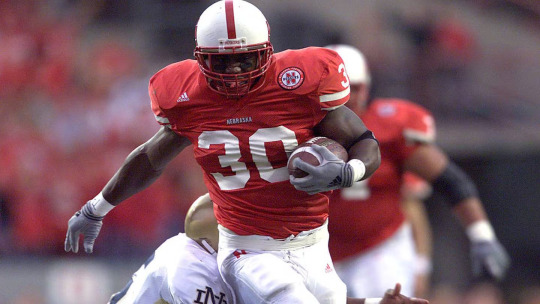
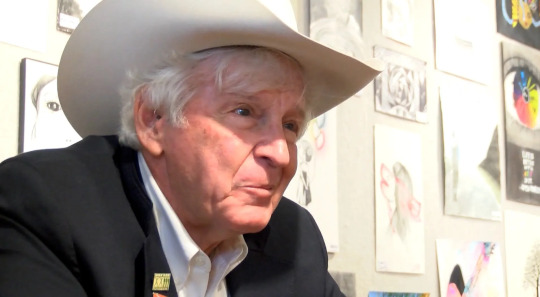

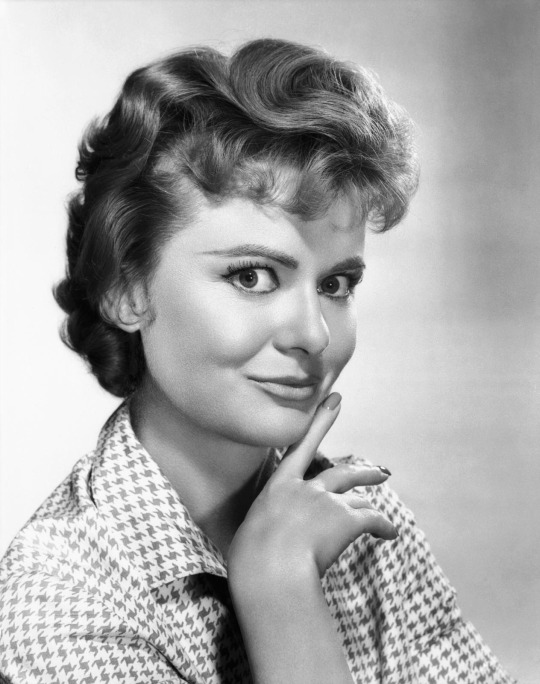
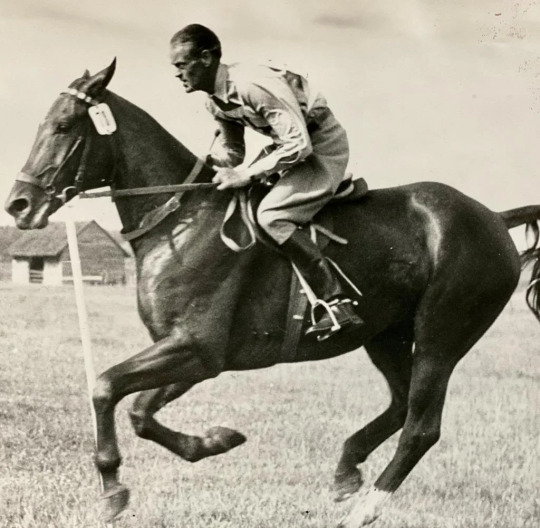
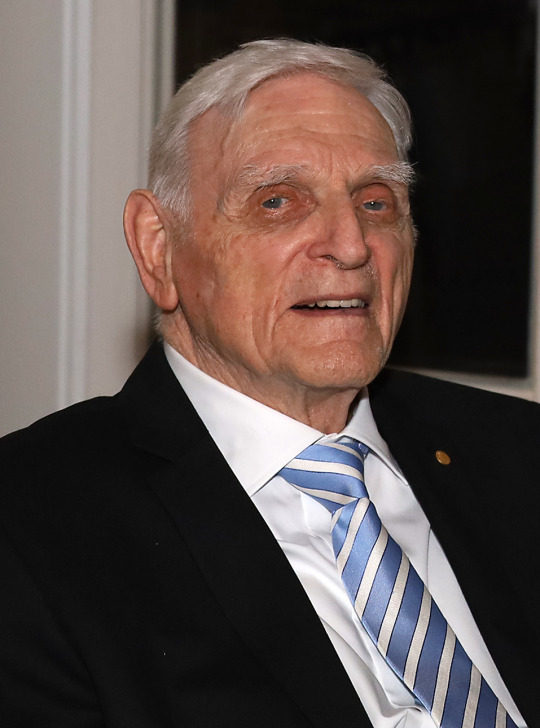





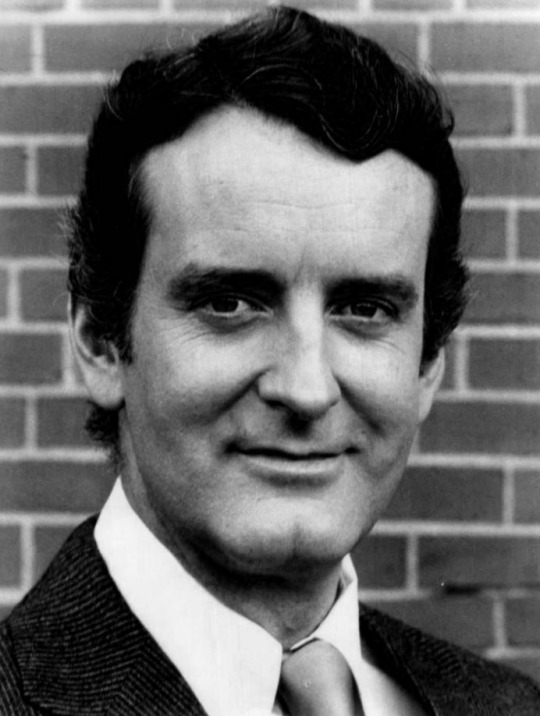





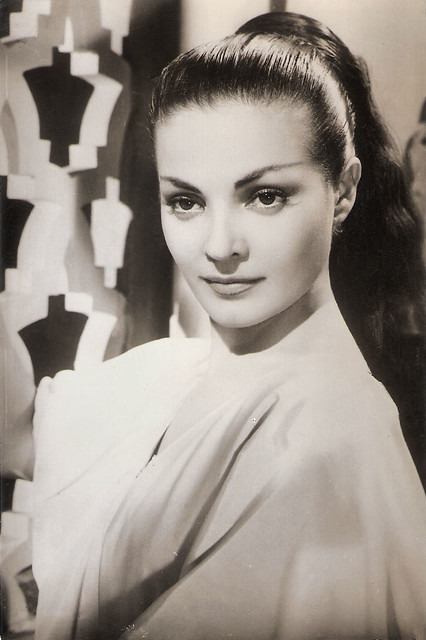

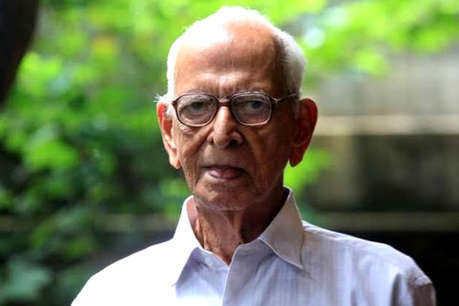


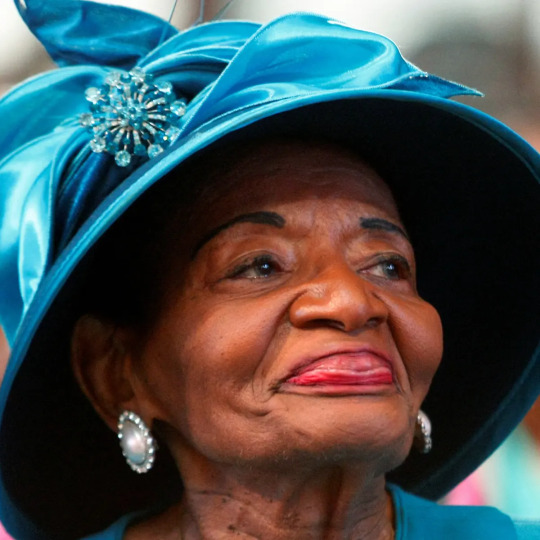





2023 In Memoriam Part 26
(William) Lee Rauch, 58
Betta St. John, 93
Dahrran Diedrick, 44
(Finis) Dean Smith, 91
2Lt. Raymond Cassignol, 102
Rowena Heath, 96
Wilhelm Büsing, 102
James Crown, 70
Prof. John B. Goodenough, 100
Leo Insam, 48
Bishop François Thibodeau, 83
Tony Bouza, 94
Prof. R.B. Bernstein, 67
Tom Beynon, 81
Nicolas Coster, 89
Rob Palmer, 66
Scott Pelleur, 64
Vladimir Sedov; Jr., 35
Mike Spivey, 69
Ryan Mallett, 35
María García aka Carmen Sevilla, 92
Joana Brito, 76
P. Chitran Namboodirippad, 103
Bobby Osborne, 91
Lowell Weicker; Jr., 92
(Willie) Christine Farris, 95
Marvin Kitman, 93
Alan Arkin, 89
Tassanee Bunyagupta, 100
Mohammad Ali, 29
Berendina Ballintijn, 100
#Religion#Tributes#Celebrities#Music#Ohio#Movies#U.K.#Sports#Football#Jamaica#Canada#Ontario#Races#Texas#Planes#Haiti#Florida#TV Shows#Washington#Animals#Germany#Money#Illinois#Colorado#Hockey#Italy#Spain#Minnesota#New York#New York City
0 notes
Link
Coloproctology: A Practical Guide 1st Edition by John Beynon, ISBN-13: 978-3319559551 [PDF eBook eTextbook] Publisher: Springer; 1st ed. 2017 edition (June 15, 2017) Language: English 332 pages ISBN-10: 3319559559 ISBN-13: 978-3319559551 The topics covered in this book have been specifically chosen to give guidance to surgeons established in practice and those embarking on their careers. Examples include the changing management in the treatment of the catastrophic abdominal wall, perianal Crohn’s disease in the biological era, decision making in rectal cancer that responds to radiotherapy, and the assessment of outcomes in colorectal cancer surgery. Recent years have seen the introduction of technical advances with respect to robotics in colorectal surgery and trans-anal total meso-rectal excision, and which are rapidly becoming established in clinical practice. Chapters also cover those aspects of colorectal practice, which are common to all, and provide guidance on management of topics including complications of radiotherapy, management of pouch dysfunction and iatrogenic complications in pelvic cancer surgery. John Beynon is currently Consultant General & Colorectal Surgeon at Singleton Hospital and honorary professor at Swansea University’s School of Medicine. Professor Beynon trained at St. Bartholomew’s Hospital Medical College qualifying in 1980 and subsequently undertook surgical training in Cardiff, Bristol and St Mark’s Hospital London. He is currently Consultant General and Colorectal Surgeon in Singleton Hospital Swansea & Honorary Professor Swansea University, School of Medicine. He was awarded his Certificate of Accreditation in General Surgery RCS in 1992 and is an accredited colonoscopist/colonoscopist assessor for Bowel Screening Wales. Professor Beynon is also a former Hunterian Professor of the Royal College of Surgeons of England & recipient of the John of Arderne Medal Royal Society of Medicine. What makes us different? • Instant Download • Always Competitive Pricing • 100% Privacy • FREE Sample Available • 24-7 LIVE Customer Support
0 notes
Link
Coloproctology: A Practical Guide 1st Edition by John Beynon, ISBN-13: 978-3319559551 [PDF eBook eTextbook] Publisher: Springer; 1st ed. 2017 edition (June 15, 2017) Language: English 332 pages ISBN-10: 3319559559 ISBN-13: 978-3319559551 The topics covered in this book have been specifically chosen to give guidance to surgeons established in practice and those embarking on their careers. Examples include the changing management in the treatment of the catastrophic abdominal wall, perianal Crohn’s disease in the biological era, decision making in rectal cancer that responds to radiotherapy, and the assessment of outcomes in colorectal cancer surgery. Recent years have seen the introduction of technical advances with respect to robotics in colorectal surgery and trans-anal total meso-rectal excision, and which are rapidly becoming established in clinical practice. Chapters also cover those aspects of colorectal practice, which are common to all, and provide guidance on management of topics including complications of radiotherapy, management of pouch dysfunction and iatrogenic complications in pelvic cancer surgery. John Beynon is currently Consultant General & Colorectal Surgeon at Singleton Hospital and honorary professor at Swansea University’s School of Medicine. Professor Beynon trained at St. Bartholomew’s Hospital Medical College qualifying in 1980 and subsequently undertook surgical training in Cardiff, Bristol and St Mark’s Hospital London. He is currently Consultant General and Colorectal Surgeon in Singleton Hospital Swansea & Honorary Professor Swansea University, School of Medicine. He was awarded his Certificate of Accreditation in General Surgery RCS in 1992 and is an accredited colonoscopist/colonoscopist assessor for Bowel Screening Wales. Professor Beynon is also a former Hunterian Professor of the Royal College of Surgeons of England & recipient of the John of Arderne Medal Royal Society of Medicine. What makes us different? • Instant Download • Always Competitive Pricing • 100% Privacy • FREE Sample Available • 24-7 LIVE Customer Support
0 notes
Link
Coloproctology: A Practical Guide 1st Edition by John Beynon, ISBN-13: 978-3319559551 [PDF eBook eTextbook] Publisher: Springer; 1st ed. 2017 edition (June 15, 2017) Language: English 332 pages ISBN-10: 3319559559 ISBN-13: 978-3319559551 The topics covered in this book have been specifically chosen to give guidance to surgeons established in practice and those embarking on their careers. Examples include the changing management in the treatment of the catastrophic abdominal wall, perianal Crohn’s disease in the biological era, decision making in rectal cancer that responds to radiotherapy, and the assessment of outcomes in colorectal cancer surgery. Recent years have seen the introduction of technical advances with respect to robotics in colorectal surgery and trans-anal total meso-rectal excision, and which are rapidly becoming established in clinical practice. Chapters also cover those aspects of colorectal practice, which are common to all, and provide guidance on management of topics including complications of radiotherapy, management of pouch dysfunction and iatrogenic complications in pelvic cancer surgery. John Beynon is currently Consultant General & Colorectal Surgeon at Singleton Hospital and honorary professor at Swansea University’s School of Medicine. Professor Beynon trained at St. Bartholomew’s Hospital Medical College qualifying in 1980 and subsequently undertook surgical training in Cardiff, Bristol and St Mark’s Hospital London. He is currently Consultant General and Colorectal Surgeon in Singleton Hospital Swansea & Honorary Professor Swansea University, School of Medicine. He was awarded his Certificate of Accreditation in General Surgery RCS in 1992 and is an accredited colonoscopist/colonoscopist assessor for Bowel Screening Wales. Professor Beynon is also a former Hunterian Professor of the Royal College of Surgeons of England & recipient of the John of Arderne Medal Royal Society of Medicine. What makes us different? • Instant Download • Always Competitive Pricing • 100% Privacy • FREE Sample Available • 24-7 LIVE Customer Support
0 notes
Photo

Virgil Finlay (1914-1971), ''Famous Fantastic Mysteries'', Vol. 11, #4, 1950 Source
#virgil finlay#american artists#illustrators#illustration#illustrations#famous fantastic mysteries#pulp magazines#pulp science fiction#weird fiction#the secret people#john beynon#scifi art
191 notes
·
View notes
Text

Vol 1 No. 2, again only dated 1946. Carnell’s own cover design, and from this distance it really isn’t all that much of an improvement on the first issue. The contents aren’t all that much of an improvement, either, sadly.
Kicking things off is ‘The Living Lies’ from one John Beynon. Beynon went on to fame, success and immortality as John Wyndham (he gloried in the full name of John Wyndham Parkes Lucas Beynon Harris, all of which he used in various combinations), but on the strength of his offering here you’d have to have been exceptionally prescient to put your money on him. ‘The Living Lies’ is a stinker. While it’s not badly written, the plot is so preposterous that it stretches the reader’s willingness to suspend disbelief past breaking point. It’s a pity, because Beynon was clearly trying to tackle some interesting issues (race, capitalism, the relationship between the two), but his central conceit that Venusian settlers from Earth manufactured their own racial problem by turning a proportion of their new-born whites either green, red or black via the application of a certain marinade and a slow bake at gas mark 3 is just too absurd.
Having said which, ‘The Living Lies’ shines in comparison to Patrick S. Selby‘s ‘Space Ship 13′ (inexplicably, the cover story), which is so poor it defies summary. It’s difficult to imagine that Carnell was so short of material that he felt the need to print this. Even the half-a-million words John Russell Fearn submitted weren’t this poor.
As proven by the next story, ‘Vicious Circle’ by Polton Cross. Cross was, of course, John Russell Fearn, and considering this, ‘Vicious Circle’ isn’t that bad. Silly, yes; undeveloped, yes; dashed off before the idea had had chance to germinate properly, probably. But for all that it’s far more interesting than any of Fearn’s contributions to No. 1. In this one, a poor chap’s timeline takes a spiral path, continually throwing him further into the future and (alternately) the past. It’s an interesting notion that could have made a pretty enjoyable novel in the hands of - say - Brian W. Aldiss.
Between these two stories is a short editorial, in which Carnell pronounces himself dissatisfied with No. 1, and states that each successive issue will see some improvement. After a little flannel about upcoming issues he notes the positive effects of the Bikini atom bomb test and the bombing of Hiroshima and Nagasaki on sales of science fiction magazines. Good-oh.
L. J. Johnson’s short article ‘Ahead of Reality’ has a similar preoccupation, tempered with a kind of told-you-so fatalism. “But now,” he says, “...enthusiasts are returning from a scientific War... they find themselves living in a world of science fiction instead of reading about it.” He concludes that “Man is fast catching up his own imagination.”
If ‘Vicious Circle’ had engendered any vague notion that John Russell Fearn had a decent story in him, it’s pretty soon trampled into extinction by Thornton Ayre’s ‘Lunar Concession’. Thornton Ayre is - again - Fearn, and one wonders if it were he or Carnell who came up with all the pseudonymns. ‘Lunar Concession’ is as dismal as all the others, and must have stunk even by the standards of 1946. The characters are the merest cut-outs, walking talking stereotypes clothed in the barest threads of a plot which is only science fiction by virtue of being set on the moon and involving some guff about a super fuel. It could just as easily be a Western, or a poor entry in the Sexton Blake Library, or something of Ian Fleming’s.
Forrest J. Ackerman’s account of ‘Pacificon’ is of little interest, but at least it cleanses the palate after the second helping of Fearn.
Sadly, there are seventeen exclamation marks on the first page of John Brody’s ‘Foreign Body’. Seventeen! And the text only takes up half the page! So it’s a pretty peppery dish. Other than that, the story is only notable for sharing the same central conceit (and insect aliens) as ‘Quatermass and the Pit’, which it predates by a good twelve years. One wonders if Nigel Kneale read it.
Alden Lorraine’s ‘The Micro Man’ is a dreadful mish-mash. Lorraine was Forrest J. Ackerman, and his story is just nonsense. It’s about a tiny man who somehow ends up on earth and is accidentally crushed by the ‘big’ man who finds him on the window-sill of a street car. Tosh, from start to finish.
W. P. Cockcroft’s ‘Green Spheres’ brings no. 2 to a close and - while it’s nothing special, being a sort of Wellsian tale of an invading species being defeated by something commonplace after all sorts of other tactics have failed - it’s (along with Vicious Circle) undoubtedly the best of the bunch. Again, one wonders if Nigel Kneale read it, or (even) John Wyndham.
#new worlds#John Beynon#John Wyndham#Patrick S. Selby#E. J. Carnell#science fiction#Polton Cross#john russell fearn#thornton ayre#forrest j. ackerman#john brody#Alden Lorraine#W. P. Cockcroft
1 note
·
View note
Text
TV REVIEW: THE MIDWICH CUCKOOS (2022), some spoilers
TV REVIEW: THE MIDWICH CUCKOOS (2022), some spoilers
Figure 1 – Midwich Cuckoos First Edition (British) Before I begin, let me congratulate our R. Graeme Cameron, who has won the Canadian Aurora Award for Fan Writing! Well done, Graeme! Back in the late 1950s, when I was a wee lad, I read everything in the library that was even vaguely science-fictional. That’s the reason I read Moonraker, by Ian Fleming, years before anyone ever heard of James…

View On WordPress
#“brood parasitism”#“Nope”#1957#alien invasion by pregnancy#black and white#Bob Ball#Children of the Damned (1964)#Column 345#Damon Knight review#Day of the Triffids#Dolores Reed#Edward G. Robinson impression#Frankie Ray Penelli#Ian Fleming#Invasion of the Star Creatures#James Bond#Jimmy Cagney impression#Joanne Arnold#John Wyndham#John Wyndham Parkes Lucas Beynon Harris#Jordan Peele#Keely Hawes#Lewis and Martin#Mark Ferris#Max Beesley#Moonraker#Out of the Deeps#pad out the movie#Panama City Florida#Peter Lorre impression
4 notes
·
View notes
Text
What was “Atlantropa?”

If you read any science fiction from the early 1900s, you get weird, veiled references over and over to the idea of merging Europe and Africa together into a single continent by manmade means, by draining and damming up the entire Mediterranean Sea, raising sea levels, and flooding the Sahara Desert to make it arable. The first person to come up with the idea of flooding the Sahara was a Scottish geologist, Donald Mackenzie, in 1877, but the best known and elaborate plan on how to do this was proposed in the 1920s by the German utopian architect Heinrich Sorgel during the Weimar Republic, who called the new continent “Atlantropa.”

And it isn’t as farfetched as it sounds, as the Mediterranean is an uncommonly shallow sea that can be dammed up at key points. It was a utopian, multi-nation Pan-European project that took for granted European colonial ownership of North Africa. The idea always seemed more feasible at moments of early pan-European sentiment, like the age of good feeling (however illusory) between the world wars, and further away during ugly European national conflicts like World War I.

A lot of science fiction from the early 20th Century mentions some version of damming the Mediterranean and flooding the Sahara as an inevitable part of the future and progress. It was taken for granted as a part of what the future would be like, which is why references to it are often opaque to modern readers - they didn’t feel the need to explain it as it was common knowledge. A good example would be Jules Verne’s last novel, Invasion of the Sea, in 1905. The book was about Berber and Tuareg tribes displaced from their homes by “progress,” victims of the technological age, who go on the warpath against Europeans in irregular guerilla warfare. It is fascinating to read later Jules Verne if you’re only familiar with his early “gee-gosh-wow” boyish adventure yarns that thrilled at gadgets, because Verne, at the end of life in his later novels, was tremendously skeptical of technology, hated colonial exploitation of native people, did not view all progress as “good,” and was concerned with modernism’s dehumanizing effects.

Another book to have frequent references to the Sahara Sea idea was the Secret People by John Wyndham (John Beynon), best known for Day of the Triffids. His book, the Secret People, is about how the damming of the Mediterranean reveals a race of European pygmies who live in caves, who survive on fungi and who capture surface people as slaves.

There’s even a great little reference to damming the Mediterranean in H. Rider Haggard’s The Yellow God from 1908, which is what prompted me to write this, because it assumed a common knowledge on his 1900s reader that a modern person wouldn’t have.
Amazingly, there are even some modern references to the Sahara Sea idea. If you ever got your mitts on the Star Trek: the Motion Picture novelization, in the early chapters set on Earth (assuming of course, that you didn’t immediately skip ahead for the rumored Kirk/Spock slash content, you naughty kids, you), you’d see references to damming and draining the Mediterranean. And I almost fell out of my chair when watching the recent “Man in the High Castle” television series where they say, out loud, the Atlantropa Project.
654 notes
·
View notes
Photo

Re-Birth. John Wyndham (pseudonym of John Beynon Harris). New York: Ballantine Books, [1955]. First edition. Original dust jacket.
Post-nuclear war religious dystopia. "An excellent story of an emerging race with ESP, hunted by 'normals' trying to hang on to traditional values, ruthlessly exterminating all deviation."
12 notes
·
View notes
Link
Coloproctology: A Practical Guide 1st Edition by John Beynon, ISBN-13: 978-3319559551 [PDF eBook eTextbook] Publisher: Springer; 1st ed. 2017 edition (June 15, 2017) Language: English 332 pages ISBN-10: 3319559559 ISBN-13: 978-3319559551 The topics covered in this book have been specifically chosen to give guidance to surgeons established in practice and those embarking on their careers. Examples include the changing management in the treatment of the catastrophic abdominal wall, perianal Crohn’s disease in the biological era, decision making in rectal cancer that responds to radiotherapy, and the assessment of outcomes in colorectal cancer surgery. Recent years have seen the introduction of technical advances with respect to robotics in colorectal surgery and trans-anal total meso-rectal excision, and which are rapidly becoming established in clinical practice. Chapters also cover those aspects of colorectal practice, which are common to all, and provide guidance on management of topics including complications of radiotherapy, management of pouch dysfunction and iatrogenic complications in pelvic cancer surgery. John Beynon is currently Consultant General & Colorectal Surgeon at Singleton Hospital and honorary professor at Swansea University’s School of Medicine. Professor Beynon trained at St. Bartholomew’s Hospital Medical College qualifying in 1980 and subsequently undertook surgical training in Cardiff, Bristol and St Mark’s Hospital London. He is currently Consultant General and Colorectal Surgeon in Singleton Hospital Swansea & Honorary Professor Swansea University, School of Medicine. He was awarded his Certificate of Accreditation in General Surgery RCS in 1992 and is an accredited colonoscopist/colonoscopist assessor for Bowel Screening Wales. Professor Beynon is also a former Hunterian Professor of the Royal College of Surgeons of England & recipient of the John of Arderne Medal Royal Society of Medicine. What makes us different? • Instant Download • Always Competitive Pricing • 100% Privacy • FREE Sample Available • 24-7 LIVE Customer Support
0 notes
Photo
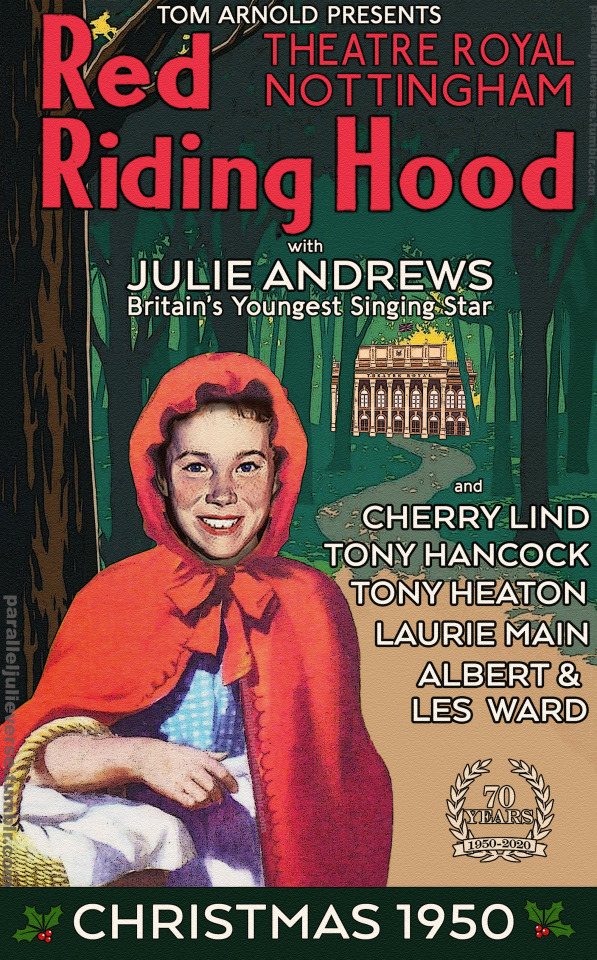
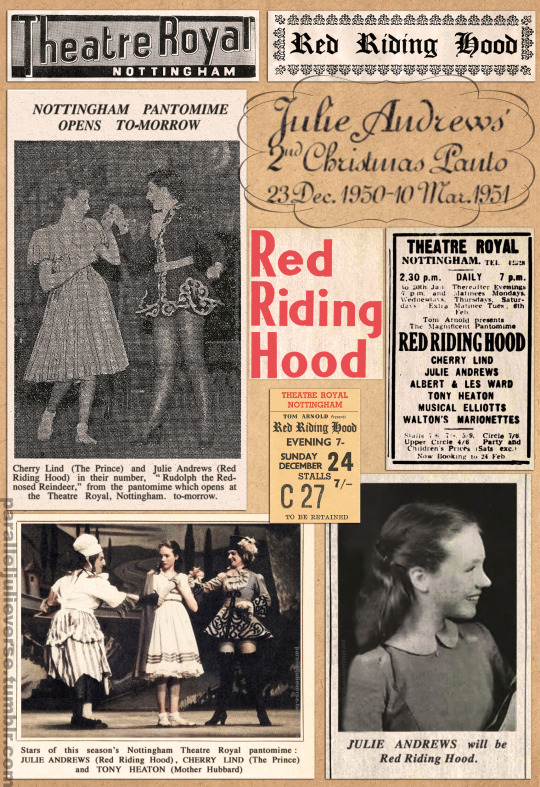
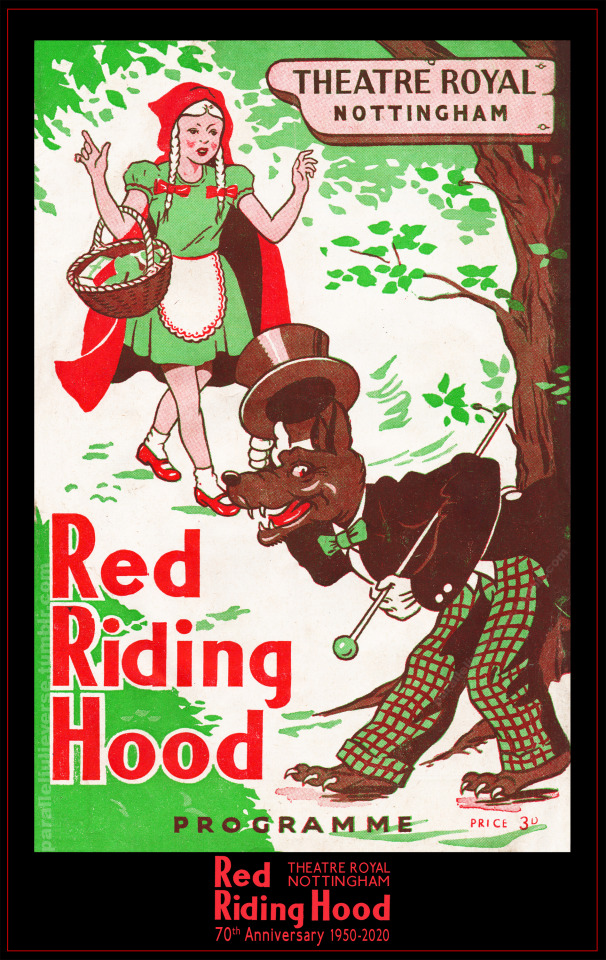
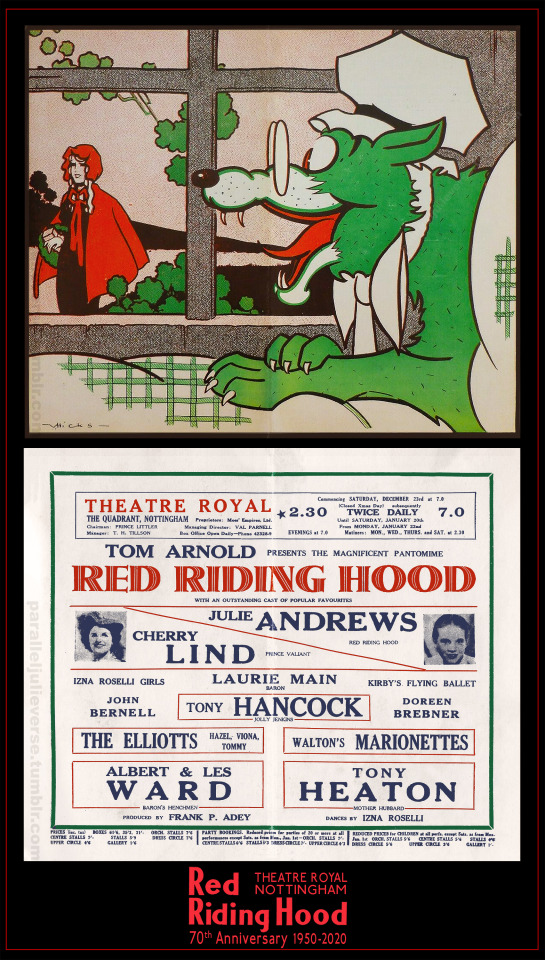
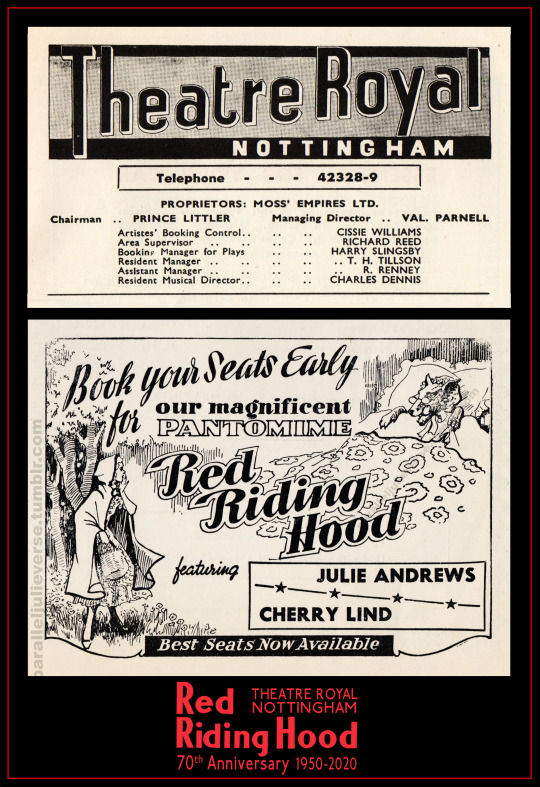
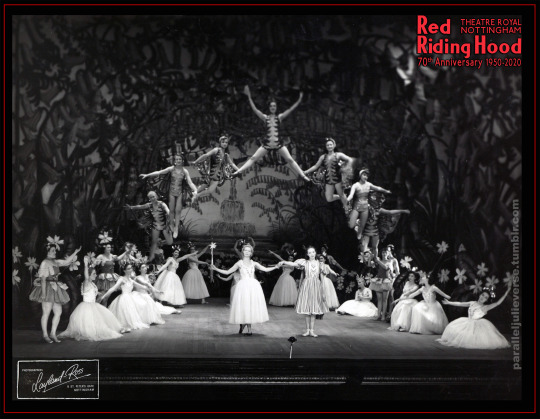
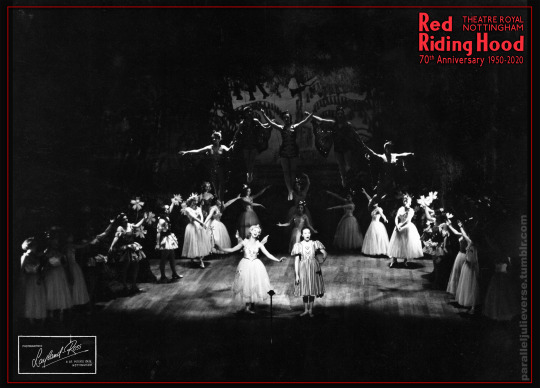
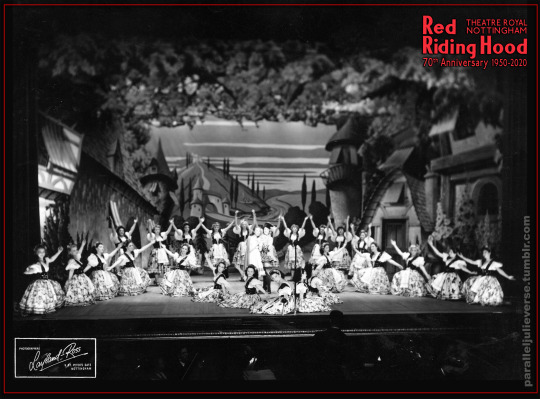
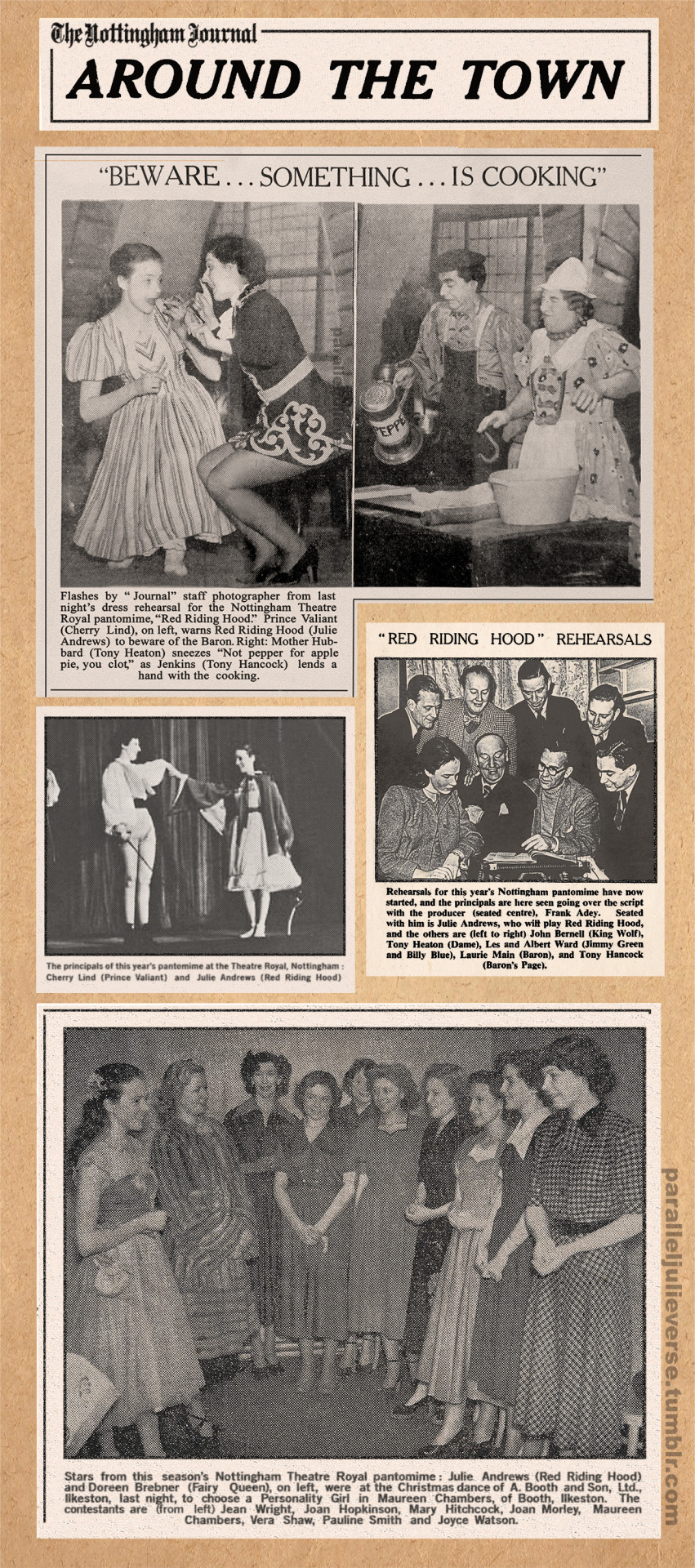
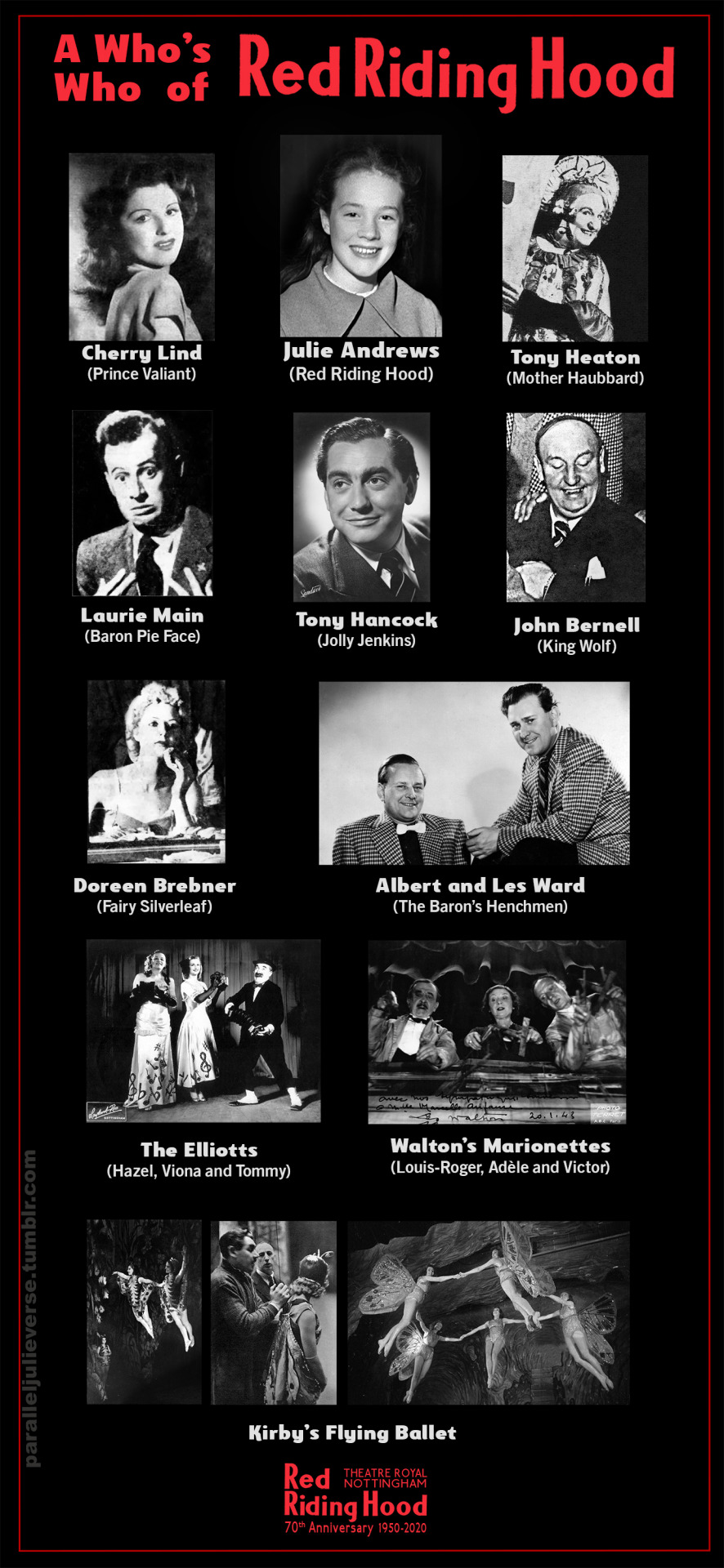
70th anniversary of Red Riding Hood Theatre Royal, Nottingham, 154 performances (23 December 1950 - 10 March 1951)
This week marks the 70th anniversary of another milestone event in the early career of Julie Andrews when the young fifteen-year old star opened in the title role of Tom Arnold’s lavish Christmas pantomime, Red Riding Hood at Nottingham’s Theatre Royal.
Red Riding Hood would be Julie’s second professional pantomime, following her earlier run in Humpty Dumpty at the London Casino in 1948/49. On paper, a stint at a provincial theatre might seem a downward career step after the West End, but Nottingham’s Theatre Royal was no backwater playhouse. One of the most luxurious venues of its day, the Theatre Royal opened in 1865 as a cultural monument to the booming prosperity of the East Midlands and, with convenient railway links to London, it soon became one of Britain’s preeminent touring houses, hosting repeated visits from major stars, both national and international, including Lillie Langtry, Sarah Bernhardt, Henry Irving and Anna Pavlova (Beynon, 11-13).
Moreover, Red Riding Hood wasn’t your run-of-the-mill small-town panto. It was a theatrical extravaganza produced by Tom Arnold, the foremost impresario of the British provinces. Specialising in prestigious family entertainments and theatre spectaculars, Arnold was reported to have staged over 400 pantomimes during his long career, earning him the nickname of Britain’s “New King of Pantomime” (”Personalia” 105; “King”, 11; “Obituary”, 15). The words “A Tom Arnold Production” on a pantomime poster or programme was a guarantee of first-rate entertainment with top-drawer talent and state-of-the-art production values.
The 1950 Christmas season would be one of Arnold’s most ambitious with a roster of big pantos in simultaneous production up and down the length of the British Isles including, Dick Whittington On Ice at the Empire Pool, Wembley; Queen of Hearts at the Wimbledon Theatre; Puss in Boots on Ice at the Brighton Sports Stadium; Dick Whittington at the Grand Theatre, Leeds; Humpty Dumpty at the Liverpool Empire; and Cinderella at the Alhambra Theatre, Glasgow (“Xmas Holiday Shows”, 12-21). Red Riding Hood at the Theatre Royal was the jewel in the crown with a generous budget, lavish set design, and A-list casting.
Charged with overseeing the Nottingham production of Red Riding Hood was Frank P. Adey, an enterprising young producer who had managed several earlier Arnold productions -- as well as big shows for other impresarios such as Emile Littler and Bernard Delfont -- and who would a few years later go on to helm the legendary Ocean Theatre in Clacton (Howlett, 5). Unlike today’s producers who are principally concerned with behind-the-scenes business, Adey was “a producer from the days when the title meant someone who put the whole show together from choosing the artistes, constructing the programme and lighting the scenery to directing the performers” (Hudd, 6). In the case of Red Riding Hood, he even co-wrote the script.
Just one year earlier, during the 1949 pantomime season, Adey had produced another version of Red Riding Hood for John Beaumont at the Lyceum Theatre in Sheffield, which is possibly why he was tapped to helm the even bigger Tom Arnold production at Nottingham (“Xmas Holiday Shows,” 1949, 15). When deciding on the cast for the 1950 show, Adey called on several of the performing talents who had worked with him in Sheffield (“Nottm.,” 6). Announced in early September, casting for the Nottingham show included:
Cherry Lind as Prince Valiant of Alluria (principal boy): A popular singer and radio personality of the post-war years, Lind had performed the “pants” role of Prince Valiant in the 1949 Sheffield production. She had also appeared previously at the Theatre Royal Nottingham in the title role of Rose Marie in 1945 (“Cherry Lind”, 5). Lind enjoyed a solid career on radio and TV into the early-60s before retiring to Brighton where she passed away in 2005 (Steel, 114-15).
Albert and Les Ward as Billy Blue and Jimmy Green (double act): This comedy brother duo were popular performers on radio variety shows of the era such as Welsh Rarebit, Variety Bandbox and Petticoat Lane. Known for their riotous “skiffle” musical performances using unconventional instruments such as washboards, bicycle pumps and spoons, the pair was cast as the comic “villainous sidekicks”, the Baron’s Henchmen, a role they had previously performed in Sheffield (“Cherry Lind”, 5; “Kings”, 24). The two brothers continued to live together in their family home in Cardiff till their deaths in 2001 and 2004 respectively (Baker, 131).
Tony Heaton as Mother Hubbard (dame): A stalwart of the British variety circuit, Heaton specialised in playing “dame” roles in pantomimes (“Dames,” 3). He had also performed this part of Mother Hubbard in the earlier Sheffield show (“Cherry Lind”, 5; “Tony Heaton”, 3). Sadly, Heaton took his own life in the sea off Blackpool in 1965 (“Drowned”, 12).
Laurie Main as Baron Pie Face of Merryvale Hall (comic): Also returning from the Sheffield production was this young character comedian from Australia who plied his trade in British variety and pantomimes throughout the 50s, before moving to the US in 1959 where he carved a solid career in theatre, film and TV till his death in 2012. As a tidbit for fans of Julie-related trivia, Main would re-team with Julie many years later when he had a brief cameo as a French general in Darling Lili (1970) (Raleigh, 5; “Laurie Main,” 11).
John Bernell as King Wolf (villain): Not a lot of information is available on Bernell, though newspaper reports indicate he made regular appearances in regional theatre productions and pantomimes throughout the 30s-50s. He had played this same role in Sheffield where he was praised as a fine stage villain with thrilling swordsmanship skills. In one of his on-stage duels with Cherry Lind, Bernell fell and fractured his wrist but, in true show-must-go-on spirit, he finished the performance before going to hospital (“Variety Gossip”, 4).
Doreen Brebner as Fairy Silverleaf (good fairy): 22-year old Brebner was a talented young ballerina from South Africa who had come to the UK under a bursary scheme. Placed under contract by dance teacher and choreographer, Izna Roselli, she did honours as the lead dancer in the Sheffield production of Red Riding Hood, supported by the Izna Roselli Girls and Kirby’s Flying Ballet. For the Nottingham show, she was ‘promoted’ to the role of the protecting fairy (”6,000 Miles”, 5).
Tony Hancock as Jolly Jenkins (comic): Last but certainly not least, the other major principal role announced in early casting was Tony Hancock in the comic part of “the silly billy, well-meaning page to the Baron” (Fisher, 102). Hancock was one of the few new additions to the Nottingham line-up, taking over a role that had been played in Sheffield by Gene Durham. Today, he is one of the most famous names in the Nottingham cast, but, at the time, Hancock was still relatively unknown. His celebrity would increase markedly the following year when he was contracted to take over the lead role of the tutor in the 1951 season of Educating Archie, before eventually proceeding to secure his own radio show and lasting fame (Fisher, 102-3).*
The one glaring omission from the early casting announcements was the title role of Red Riding Hood herself. In Sheffield, this “principal girl” role had been performed by Valerie Ashton, a young singer-dancer and stage beauty who, by all accounts, acquitted herself well enough -- “a typical and pleasing Red Riding Hood” was the verdict of one reviewer (“Spotlight”, 5) -- but a bigger marquee name was needed to helm the more expensive Nottingham production and serve as a box office draw.
It’s not known when or how the idea to cast Julie Andrews in the title role of Red Riding Hood first emerged but, by 1950, she was a young star firmly on the ascendant. Her celebrated debut run in Starlight Roof and subsequent appearance as the youngest ever performer at a Royal Command Performance in 1948 had earned her widespread publicity as “Britain’s youngest prima donna”. While her increasing presence on radio, especially her regular stint on the hit BBC programme, Educating Archie, boosted her celebrity and helped make her a nationwide name. Julie had also worked on a previous Tom Arnold production with her 1949 summer run in Coconut Grove at the Blackpool Hippodrome, so she would have been on the company’s radar.
Either way, negotiations to secure Julie for Red Riding Hood commenced at some point in 1950. They were protracted and, one suspects, intense. Whereas casting for all the other principals was announced in September, Julie’s participation wasn’t officially confirmed till much later in November (“Julie Andrews”, 1; “More”, 5). Throughout this period, there were persistent rumours of her involvement, with one over-eager newspaper having to issue a front-page retraction after it had published a premature report in early October that the young star had been signed. “Nothing definite has yet been arranged. No contract has been signed,” it clarified, “but it is hoped that Miss Andrews will play Red Riding Hood” (“Red Riding Hood: Premature Report,” 1). In the end, a contract was signed and formally announced in mid-November, giving Julie co-star billing with Cherry Lind and, reportedly, a £200 weekly fee -- “big money then for a 15-year old entertainer in Britain” (Cottrell 57 ).
Rehearsals for the pantomime commenced on Monday 11 December with all the company and principals congregating for a script read-through, save Cherry Lind whose arrival was delayed due to a broadcasting commitment in Bristol (“Nottm. Panto. Rehearsals,” 6). Such was the level of public interest in the show that the 'table read’ was covered widely in the local and regional press. For the first week, the cast rehearsed at the Orchestra Club in Nottingham, before moving into the Theatre Royal the following Monday 18 December for on-stage rehearsals. In her memoirs, Julie recounts how her mother and aunt motored up with her to Nottingham in the family caravan where they all stayed for the two weeks of rehearsals to help Julie settle in; after which the two women returned home and Julie moved in to the Country Hotel with Cherry Lind and the other principals for the run of the show (Andrews, 129).
As was customary with pantomime, Red Riding Hood hewed to the time-honoured formula of a well-known fairy tale told with a colourful mix of music, comedy, spectacle and audience participation. By the mid-twentieth century, the received industry wisdom for mounting a pantomime was to offer something for everyone in the audience: “broad but not coarse comedy for the kids...lots of song and dance for the grown-ups, and the whole thing mov[ing] quickly from scene to scene so that no one has time to get bored” (Robertshaw, 15). This variety showcase of “events and comedy routines” was typically keyed into “the skills of the performers booked” with pantos of the era often playing “like spectacular variety shows” (Taylor, 34-35).
Producer Frank Adey, however, was of the conviction that a good pantomime needed to adhere to a well-crafted story without too many extraneous elaborations. “Everyone who comes to panto gets in to the spirit of things,” he said, “and that spirit is the story. You must not deviate and make it a revue. It must be first a pantomime and last a pantomime” (“Nottm. Panto. Rehearsals,” 6). Thus, whatever schtick individual performers were allowed was for the most part integrated into the book and showcase moments were largely played “in character”.**
With Julie in the title role -- and the equally popular singing personality, Cherry Lind as co-star -- the Nottingham production placed a premium on music and song. Indeed, Adey revised the script so that Red Riding Hood would burst into song whenever she was afraid, thereby “giving Julie ample opportunity to show her stuff” (Arntz and Wilson, 17). In classic panto style, popular songs of the day were interpolated into the score so that audiences could sing along. Thus, at one point in proceedings, Julie and Cherry Lind led the house in a rousing rendition of the newly minted Christmas hit, “Rudolph, the Red-Nosed Reindeer” (Stevenson, 3). Other popular standards featured in the show included: ‘If You Feel Like Singing” and the Flanagan and Allen hit, “Hey, Neighbour”(Stevenson, 3). However, Adey also revived the “earlier pantomime tradition” of featuring classical music by “composers such as Tschaikovsky...Offenbach, Edward German and others” (ibid.). In this way, Julie got to air her classical training by singing “amongst other things the 'Waltz Song' from Tom Jones with its many trills” and ‘The Gypsy and the Bird' by Sir Julius Benedict (Stevenson, 3; see also Andrews: 130).
The final dress rehearsal for Red Riding Hood took place on 22 December in front of a charity audience of over 550 children from local care homes and hospitals (“Night of their Lives,” 2). Newspaper reports described that the excited children “oohed and aahed” and “gurgled with glee” and “gasped at their first view of Fairlyland,” noting that:
“A special cheer was reserved for the first entrance of Red Riding Hood. Miss Andrews, only a few months older than the oldest of the children, showed her gratitude by singing to them..with a voice like silver” (“Night of their Lives,” 2).
Once the show had officially opened on 23 December, press reviews were similarly appreciative:
The Nottingham Journal: “Cherry Lind and Julie Andrews...are the best principal boy and girl whom Nottingham has had for many a long year. Both have delightful voices -- Julie’s being phenomenal” (Stevenson, “Showpiece,” 4).
The Nottingham Guardian: “Principal Boy Cherry Lind and Principal Girl Julie Andrews have youth and lovely voices to help them make their parts everything they should be. Julie Andrews’s voice especially is astonishingly good -- good for a singer of any age, astonishing because she is only 15...We can’t all sing like Julie Andrews, but the next best thing when mid-twentieth century conditions become a little too fearsome is to go and hear her and escape for three hours to the world of pantomime” (“Emphasis on Tradition”, 5).
The Nottingham Evening Post: “Red Riding Hood is everything it should be...Principal Boy Cherry Lind and Principal Girl Julie Andrews make the most charming pair...They, with Archie Stanton conducting the theatre orchestra, attend to the music and the heroics” (“Nottm. Panto. Sticks,” 1).
The Nottingham Evening News: “It would be necessary to go back many years to find a principal boy and girl equal to Cherry Lind and Julie Andrews. Both have lovely voices but, because of her age, Julie’s is phenomenal. Who would expect to hear the soaring notes and the trills of a coloratura soprano coming from the throat of a fifteen-year-old who looks ‘that nice youngster from next door’. Their duet ‘Your heart and My Heart’ is one of the the most delightful things imaginable” (WBS, 1).
The Football Post: “This year’s show is firmly based on tradition and is packed with action, colour, spectacle, song and dance. Cherry Lind as the Prince and Julie Andrews as Red Riding Hood make an admirable couple, and they are supported by a strong comedy team (“Pantomime Keeps,” 11)
The Stage: “Frank P. Adey is this year giving Nottingham the most lavish pantomime it has seen for a good many years...Red Riding Hood has all colour, melody, melodrama and well-known jokes and situations that have always delighted children -- and their parents -- but a little more emphasis is laid on the melody and song than is perhaps usual. And it is natural that this should be so, for Cherry Lind and the young Julie Andrews, in addition to making a very charming Prince and Red Riding Hood, show that they have two of the sweetest voices heard in Nottingham for a long time” (“Xmas Holiday Shows,” 1950, 15).
The glowing reception of Red Riding Hood extended equally to audiences. Ticket sales were excellent and the show played to capacity houses. Coach and rail tours brought a steady flow of group bookings from near and far. Red Riding Hood “continues its triumphant course at the Theatre Royal, Nottingham,” noted one newspaper report in mid-January, “with a seemingly inexhaustible supply of patrons queueing to see Cherry Lind...and Julie Andrews” ( “New Revue,” 11). Audience demand was so strong that the show was extended several times beyond its original closing date of early February (“Panto. Extended.” 11). The run was initially extended till 3 March, after which it was extended a further week, finally closing on 10 March after 154 performances.
Notes:
* Quite a few commentators suggest erroneously that Julie and Tony Hancock already knew each other prior to Red Riding Hood due to the fact they had worked together on Educating Archie (Stirling, 38). Even Julie makes the claim in her memoirs: “Since he [Hancock] had performed in Educating Archie, I knew him a little and liked him, although we hadn’t had much connection on the radio show” (Andrews, 131). However, Tony Hancock didn’t start performing in Educating Archie till the second series in August 1951, many months after the end of Red Riding Hood.
** I say “for the most part” because Red Riding Hood did include an extended "interval” where the popular local specialty act, the Musical Elliotts, did a comic virtuoso turn playing miniature concertinas, followed by another family troupe, Walton’s Marionettes, who put on a puppet show, but this interlude was designed largely as a self-contained “show within a show” that gave the main cast -- and the audience -- a breather between acts (Stevenson, 3).
Sources:
“6,000 Miles From Home.” Sheffield Daily Telegraph. 14 January 1950: 5.
Andrews, Julie. Home: A Memoir of My Early Years. London: Weidenfeld & Nicolson, 2008.
Arntz, James and Wilson, Tom. Julie Andrews. Chicago, IL.: Contemporary Books, 1995.
Baker, Richard A. Old Time Variety: An Illustrated History. Barnsley: Remember When, 2011.
“Beware Something is Cooking.” The Nottingham Journal. 22 December 1950: 5.
Beynon, Robin, ed. The Theatre Royal Nottingham, 1875-1978: A Theatrical and Architectural History. Nottingham: Nottingham City Council Theatre Royal Sub-committee, 1978.
“Cherry Lind Stars in Nottingham Pantomime.” The Nottingham Journal. 12 September 1950: 5.
Cottrell, John. Julie Andrews: The Story of a Star. London: Arthur Barker, 1968.
“‘Dames’ Win Praise.” The Star Green 'Un. 7 January 1950: 3.
“Drowned Comedian Faced Arrest.” The Guardian. 28 August 1965: 12.
“Entertainments: Lyceum Theatre Sheffield.” Derbyshire Times. 22 December 1949: 10.
“Emphasis on Tradition in ‘Red Riding Hood.” The Nottingham Guardian. 27 December 1950: 5.
Fisher, John. Tony Hancock: The Definitive Biography. London: HarperCollins, 2008.
Howlett, Sue. “Frank of the Ocean Calls It a Day.” Clacton Gazette. 6 May 1977: 5.
Hudd, Roy. Roy Hudd's Book of Music-hall, Variety and Showbiz Anecdotes. London: Robson Books, 1994.
“Ilkeston Firm’s Event.” The Nottingham Evening Post. 16 December 1950: 1.
“Julie Andrews Will Be Red Riding Hood.” The Nottingham Journal. 22 November 1950: 1.
“Variety Gossip: John Bernell.” The Stage. 16 March 1950: 4.
“The Jones Family Goes to Fairyland.” The Nottingham Journal. 23 December 1950: 3.
“King of Pantomime Dies”. The Illustrated London News. 8 February 1969: 11.
“Kings of the Washboard: Albert and Les Ward.” The Hampshire Telegraph. 6 December 1957: 24.
“Laurie Main, Narrator on TV’s ‘Welcome to Pooh Corner,’ Dies at 89.” Hollywood Reporter. 16 February 2012: 11.
“More about Theatre Royal Panto.” The Nottingham Evening Post. 20 November 1950: 5.
“New Revue for the Nottm. Empire.” The Football Post, 13 January 1951: 11.
“Night of their Lives: Children at Panto. Dress Rehearsal.” The Nottingham Evening Post. 23 December 1950: 2.
“Nottingham Bill of Christmas Entertainment.” The Football Post. 23 December 1950: 11.
“Nottingham Dancers in Pantomime.” The Nottingham Journal. 12 December 1950: 3.
“Nottingham Panto Principals.” The Nottingham Evening Post. 4 December 1950: 1.
“Nottm. Panto. Principals.” The Nottingham Evening Post. 11 September 1950: 6.
“Nottm. Panto. Rehearsals Begin.” The Nottingham Evening Post. 11 December 1950: 6.
“Nottm. Panto. Sticks to Tradition.” The Nottingham Evening Post. 26 December 1950: 1.
“Obituary: Tom Arnold.” The Stage. 6 February 1969: 15.
“Panto. Extended.” The Football Post. 3 February 1951: 11.
“Panto King, Tom Arnold, is Dead.” Daily Mirror. 3 February 1969: 5.
“Pantomime Forecasts.” The Stage. 24 November 1949: 8.
“Pantomime Keeps Christmas Spirit Going.” The Football Post. 30 December 1950: 11.
“Personalia: The New King of Pantomime.” The Sphere. 20 April 1935: 105.
Raleigh, H.M. “The Repertory Theatre: Talented Players at Sheffield.” Yorkshire Post and Leeds Mercury. 24 June 1950: 5.
“Red Riding Hood: Premature Report.” The Nottingham Evening Post. 3 October 1950: 1.
“‘Red Riding Hood’ Rehearsals.” The Nottingham Evening Post. 11 December 1950: 1.
Robertshaw, Ursula. “Bo-Peep in Bath.” The Illustrated London News. 6 January 1968: 14-15.
“Spotlight on Entertainment.” The Derbyshire Times. 13 January 1950: 5.
“Stars from this Season’s Nottingham Theatre Royal Pantomime.” The Nottingham Journal. 20 December 1950: 1.
Steel, Tracey. “Whatever Happened to...?” Evergreen: A Miscellany of This & That & Things Gone By, Summer 2019: 114-15.
Stevenson, Bernard. “Stage and Screen: Panto in Full Swing in Nottm and District.” Nottingham Evening News. 30 December 1950: 3.
Stevenson, W.B. “Showpiece: First Red Riding Hood since 1919.” The Nottingham Journal. 12 September 1950: 4.
Stevenson, W.B.“‘Red Riding Hood’ in Tradition.” The Nottingham Journal. 23 December 1950: 3.
Stevenson, W.B.“Showpiece: Hot Music or ‘H.P.’” The Nottingham Journal. 27 December 1950: 4.
Stirling, Richard. Julie Andrews: An Intimate Biography. London: Portrait, 2007.
Taylor, Millie. British Pantomime Performance. Bristol: Intellect Books, 2007.
“Tony Heaton.” The Stage. 2 September 1965: 3.
W.B.S. “A Grand Panto: Red Riding Hood opens in Nottm.” The Nottingham Evening News, 26 December 1950: 1.
“Xmas Holiday Shows.” The Stage. 30 December 1949: 12-21.
“Xmas Holiday Shows.” The Stage. 29 December 1950: 12-21.
Copyright © Brett Farmer 2020
#julie andrews#red riding hood#pantomime#christmas#theatre royal#nottingham#british theatre#1950#theatre history#70th Anniversary#panto#the parallel julieverse
28 notes
·
View notes
